

The History of Homework: Why Was it Invented and Who Was Behind It?
- By Emily Summers
- February 14, 2020
Homework is long-standing education staple, one that many students hate with a fiery passion. We can’t really blame them, especially if it’s a primary source of stress that can result in headaches, exhaustion, and lack of sleep.
It’s not uncommon for students, parents, and even some teachers to complain about bringing assignments home. Yet, for millions of children around the world, homework is still a huge part of their daily lives as students — even if it continues to be one of their biggest causes of stress and unrest.
It makes one wonder, who in their right mind would invent such a thing as homework?
Who Invented Homework?
Pliny the younger: when in ancient rome, horace mann: the father of modern homework, the history of homework in america, 1900s: anti-homework sentiment & homework bans, 1930: homework as child labor, early-to-mid 20th century: homework and the progressive era, the cold war: homework starts heating up, 1980s: homework in a nation at risk, early 21 st century, state of homework today: why is it being questioned, should students get homework pros of cons of bringing school work home.

Online, there are many articles that point to Roberto Nevilis as the first educator to give his students homework. He created it as a way to punish his lazy students and ensure that they fully learned their lessons. However, these pieces of information mostly come from obscure educational blogs or forum websites with questionable claims. No credible news source or website has ever mentioned the name Roberto Nevilis as the person who invented homework . In fact, it’s possible that Nevilis never even existed.
As we’re not entirely sure who to credit for creating the bane of students’ existence and the reasons why homework was invented, we can use a few historical trivia to help narrow down our search.
Mentions of the term “homework” date back to as early as ancient Rome. In I century AD, Pliny the Younger , an oratory teacher, supposedly invented homework by asking his followers to practice public speaking at home. It was to help them become more confident and fluent in their speeches. But some would argue that the assignment wasn’t exactly the type of written work that students have to do at home nowadays. Only introverted individuals with a fear of public speaking would find it difficult and stressful.
It’s also safe to argue that since homework is an integral part of education, it’s probable that it has existed since the dawn of learning, like a beacon of light to all those helpless and lost (or to cast darkness on those who despise it). This means that Romans, Enlightenment philosophers, and Middle Age monks all read, memorized, and sang pieces well before homework was given any definition. It’s harder to play the blame game this way unless you want to point your finger at Horace Mann.
In the 19 th century, Horace Mann , a politician and educational reformer had a strong interest in the compulsory public education system of Germany as a newly unified nation-state. Pupils attending the Volksschulen or “People’s Schools” were given mandatory assignments that they needed to complete at home during their own time. This requirement emphasized the state’s power over individuals at a time when nationalists such as Johann Gottlieb Fichte were rallying support for a unified German state. Basically, the state used homework as an element of power play.
Despite its political origins, the system of bringing school assignments home spread across Europe and eventually found their way to Horace Mann, who was in Prussia at that time. He brought the system home with him to America where homework became a daily activity in the lives of students.
Despite homework being a near-universal part of the American educational experience today, it hasn’t always been universally accepted. Take a look at its turbulent history in America.
In 1901, just a few decades after Horace Mann introduced the concept to Americans, homework was banned in the Pacific state of California . The ban affected students younger than 15 years old and stayed in effect until 1917.
Around the same time, prominent publications such as The New York Times and Ladies’ Home Journal published statements from medical professionals and parents who stated that homework was detrimental to children’s health.
In 1930, the American Child Health Association declared homework as a type of child labor . Since laws against child labor had been passed recently during that time, the proclamation painted homework as unacceptable educational practice, making everyone wonder why homework was invented in the first place.
However, it’s keen to note that one of the reasons why homework was so frowned upon was because children were needed to help out with household chores (a.k.a. a less intensive and more socially acceptable form of child labor).
During the progressive education reforms of the late 19 th and early 20 th centuries, educators started looking for ways to make homework assignments more personal and relevant to the interests of individual students. Maybe this was how immortal essay topics such as “What I Want to Be When I Grow Up” and “What I Did During My Summer Vacation” were born.
After World War II, the Cold War heated up rivalries between the U.S. and Russia. Sputnik 1’s launch in 1957 intensified the competition between Americans and Russians – including their youth.
Education authorities in the U.S. decided that implementing rigorous homework to American students of all ages was the best way to ensure that they were always one step ahead of their Russian counterparts, especially in the competitive fields of Math and Science.
In 1986, the U.S. Department of Education’s pamphlet, “What Works,” included homework as one of the effective strategies to boost the quality of education. This came three years after the National Commission on Excellence in Education published “ Nation at Risk: The Imperative for Educational Reform .” The landmark report lambasted the state of America’s schools, calling for reforms to right the alarming direction that public education was headed.
Today, many educators, students, parents, and other concerned citizens have once again started questioning why homework was invented and if it’s still valuable.
Homework now is facing major backlash around the world. With more than 60% of high school and college students seeking counselling for conditions such as clinical depression and anxiety, all of which are brought about by school, it’s safe to say that American students are more stressed out than they should be.
After sitting through hours at school, they leave only to start on a mountain pile of homework. Not only does it take up a large chunk of time that they can otherwise spend on their hobbies and interests, it also stops them from getting enough sleep. This can lead to students experiencing physical health problems, a lack of balance in their lives, and alienation from their peers and society in general.
Is homework important and necessary ? Or is it doing more harm than good? Here some key advantages and disadvantages to consider.
- It encourages the discipline of practice
Using the same formula or memorizing the same information over and over can be difficult and boring, but it reinforces the practice of discipline. To master a skill, repetition is often needed. By completing homework every night, specifically with difficult subjects, the concepts become easier to understand, helping students polish their skills and achieve their life goals.
- It teaches students to manage their time
Homework goes beyond just completing tasks. It encourages children to develop their skills in time management as schedules need to be organized to ensure that all tasks can be completed within the day.
- It provides more time for students to complete their learning process
The time allotted for each subject in school is often limited to 1 hour or less per day. That’s not enough time for students to grasp the material and core concepts of each subject. By creating specific homework assignments, it becomes possible for students to make up for the deficiencies in time.
- It discourages creative endeavors
If a student spends 3-5 hours a day on homework, those are 3-5 hours that they can’t use to pursue creative passions. Students might like to read leisurely or take up new hobbies but homework takes away their time from painting, learning an instrument, or developing new skills.
- Homework is typically geared toward benchmarks
Teachers often assign homework to improve students’ test scores. Although this can result in positive outcomes such as better study habits, the fact is that when students feel tired, they won’t likely absorb as much information. Their stress levels will go up and they’ll feel the curriculum burnout.
- No evidence that homework creates improvements
Research shows that homework doesn’t improve academic performance ; it can even make it worse. Homework creates a negative attitude towards schooling and education, making students dread going to their classes. If they don’t like attending their lessons, they will be unmotivated to listen to the discussions.
With all of the struggles that students face each day due to homework, it’s puzzling to understand why it was even invented. However, whether you think it’s helpful or not, just because the concept has survived for centuries doesn’t mean that it has to stay within the educational system.
Not all students care about the history of homework, but they all do care about the future of their educational pursuits. Maybe one day, homework will be fully removed from the curriculum of schools all over the world but until that day comes, students will have to burn the midnight oil to pass their requirements on time and hopefully achieve their own versions of success.
About the Author
Emily summers.

What Is Fundraising and How Does It Work

Why Choosing Electrician Training Could Be Your Best Move

Tips for balancing technology and your child’s growth

Male and Female Cannabis Flowers Identifying the Differences

Debunking the Myth of Roberto Nevilis: Who Really Invented Homework?

Is the D Important in Pharmacy? Why Pharm.D or RPh Degrees Shouldn’t Matter

How to Email a Professor: Guide on How to Start and End an Email Conversation

Everything You Need to Know About Getting a Post-Secondary Education

Grammar Corner: What’s The Difference Between Analysis vs Analyses?

The Surprising History of Homework Reform
Really, kids, there was a time when lots of grownups thought homework was bad for you.

Homework causes a lot of fights. Between parents and kids, sure. But also, as education scholar Brian Gill and historian Steven Schlossman write, among U.S. educators. For more than a century, they’ve been debating how, and whether, kids should do schoolwork at home .

At the dawn of the twentieth century, homework meant memorizing lists of facts which could then be recited to the teacher the next day. The rising progressive education movement despised that approach. These educators advocated classrooms free from recitation. Instead, they wanted students to learn by doing. To most, homework had no place in this sort of system.
Through the middle of the century, Gill and Schlossman write, this seemed like common sense to most progressives. And they got their way in many schools—at least at the elementary level. Many districts abolished homework for K–6 classes, and almost all of them eliminated it for students below fourth grade.
By the 1950s, many educators roundly condemned drills, like practicing spelling words and arithmetic problems. In 1963, Helen Heffernan, chief of California’s Bureau of Elementary Education, definitively stated that “No teacher aware of recent theories could advocate such meaningless homework assignments as pages of repetitive computation in arithmetic. Such an assignment not only kills time but kills the child’s creative urge to intellectual activity.”
But, the authors note, not all reformers wanted to eliminate homework entirely. Some educators reconfigured the concept, suggesting supplemental reading or having students do projects based in their own interests. One teacher proposed “homework” consisting of after-school “field trips to the woods, factories, museums, libraries, art galleries.” In 1937, Carleton Washburne, an influential educator who was the superintendent of the Winnetka, Illinois, schools, proposed a homework regimen of “cooking and sewing…meal planning…budgeting, home repairs, interior decorating, and family relationships.”
Another reformer explained that “at first homework had as its purpose one thing—to prepare the next day’s lessons. Its purpose now is to prepare the children for fuller living through a new type of creative and recreational homework.”
That idea didn’t necessarily appeal to all educators. But moderation in the use of traditional homework became the norm.
Weekly Newsletter
Get your fix of JSTOR Daily’s best stories in your inbox each Thursday.
Privacy Policy Contact Us You may unsubscribe at any time by clicking on the provided link on any marketing message.
“Virtually all commentators on homework in the postwar years would have agreed with the sentiment expressed in the NEA Journal in 1952 that ‘it would be absurd to demand homework in the first grade or to denounce it as useless in the eighth grade and in high school,’” Gill and Schlossman write.
That remained more or less true until 1983, when publication of the landmark government report A Nation at Risk helped jump-start a conservative “back to basics” agenda, including an emphasis on drill-style homework. In the decades since, continuing “reforms” like high-stakes testing, the No Child Left Behind Act, and the Common Core standards have kept pressure on schools. Which is why twenty-first-century first graders get spelling words and pages of arithmetic.
Support JSTOR Daily! Join our new membership program on Patreon today.

JSTOR is a digital library for scholars, researchers, and students. JSTOR Daily readers can access the original research behind our articles for free on JSTOR.
Get Our Newsletter
More stories.

- Wild Saints and Holy Fools

Building Classroom Discussions around JSTOR Daily Syllabi

Scaffolding a Research Project with JSTOR

Making Implicit Racism
Recent posts.
- Sui Sin Far, the Chinese Canadian-American Sentimentalist
- An Editor Bids JSTOR Daily Farewell
- The Federalist No. 1: Annotated
- Ronald Reagan’s Library Legacy
Support JSTOR Daily
Sign up for our weekly newsletter.
History Cooperative
The Homework Dilemma: Who Invented Homework?
The inventor of homework may be unknown, but its evolution reflects contributions from educators, philosophers, and students. Homework reinforces learning, fosters discipline, and prepares students for the future, spanning from ancient civilizations to modern education. Ongoing debates probe its balance, efficacy, equity, and accessibility, prompting innovative alternatives like project-based and personalized learning. As education evolves, the enigma of homework endures.
Table of Contents
Who Invented Homework?
While historical records don’t provide a definitive answer regarding the inventor of homework in the modern sense, two prominent figures, Roberto Nevelis of Venice and Horace Mann, are often linked to the concept’s early development.
Roberto Nevelis of Venice: A Mythical Innovator?
Roberto Nevelis, a Venetian educator from the 16th century, is frequently credited with the invention of homework. The story goes that Nevelis assigned tasks to his students outside regular classroom hours to reinforce their learning—a practice that aligns with the essence of homework. However, the historical evidence supporting Nevelis as the inventor of homework is rather elusive, leaving room for skepticism.
While Nevelis’s role remains somewhat mythical, his association with homework highlights the early recognition of the concept’s educational value.
Horace Mann: Shaping the American Educational Landscape
Horace Mann, often regarded as the “Father of American Education,” made significant contributions to the American public school system in the 19th century. Though he may not have single-handedly invented homework, his educational reforms played a crucial role in its widespread adoption.
Mann’s vision for education emphasized discipline and rigor, which included assigning tasks to be completed outside of the classroom. While he did not create homework in the traditional sense, his influence on the American education system paved the way for its integration.
The invention of homework was driven by several educational objectives. It aimed to reinforce classroom learning, ensuring knowledge retention and skill development. Homework also served as a means to promote self-discipline and responsibility among students, fostering valuable study habits and time management skills.
Why Was Homework Invented?
The invention of homework was not a random educational practice but rather a deliberate strategy with several essential objectives in mind.
Reinforcing Classroom Learning
Foremost among these objectives was the need to reinforce classroom learning. When students leave the classroom, the goal is for them to retain and apply the knowledge they have acquired during their lessons. Homework emerged as a powerful tool for achieving this goal. It provided students with a structured platform to revisit the day’s lessons, practice what they had learned, and solidify their understanding.
Homework assignments often mirrored classroom activities, allowing students to extend their learning beyond the confines of school hours. Through the repetition of exercises and tasks related to the curriculum, students could deepen their comprehension and mastery of various subjects.
Fostering Self-Discipline and Responsibility
Another significant objective behind the creation of homework was the promotion of self-discipline and responsibility among students. Education has always been about more than just the acquisition of knowledge; it also involves the development of life skills and habits that prepare individuals for future challenges.
By assigning tasks to be completed independently at home, educators aimed to instill valuable study habits and time management skills. Students were expected to take ownership of their learning, manage their time effectively, and meet deadlines—a set of skills that have enduring relevance in contemporary education and beyond.
Homework encouraged students to become proactive in their educational journey. It taught them the importance of accountability and the satisfaction of completing tasks on their own. These life skills would prove invaluable in their future endeavors, both academically and in the broader context of their lives.
When Was Homework Invented?
The roots of homework stretch deep into the annals of history, tracing its origins to ancient civilizations and early educational practices. While it has undergone significant evolution over the centuries, the concept of extending learning beyond the classroom has always been an integral part of education.
Earliest Origins of Homework and Early Educational Practices
The idea of homework, in its most rudimentary form, can be traced back to the earliest human civilizations. In ancient Egypt , for instance, students were tasked with hieroglyphic writing exercises. These exercises served as a precursor to modern homework, as they required students to practice and reinforce their understanding of written language—an essential skill for communication and record-keeping in that era.
In ancient Greece , luminaries like Plato and Aristotle advocated for the use of written exercises as a tool for intellectual development. They recognized the value of practice in enhancing one’s knowledge and skills, laying the foundation for a more systematic approach to homework.
The ancient Romans also played a pivotal role in the early development of homework. Young Roman students were expected to complete assignments at home, with a particular focus on subjects like mathematics and literature. These assignments were designed to consolidate their classroom learning, emphasizing the importance of practice in mastering various disciplines.
READ MORE: Who Invented Math? The History of Mathematics
The practice of assigning work to be done outside of regular school hours continued to evolve through various historical periods. As societies advanced, so did the complexity and diversity of homework tasks, reflecting the changing needs and priorities of education.
The Influence of Educational Philosophers
While the roots of homework extend to ancient times, the ideas of renowned educational philosophers in later centuries further contributed to its development. John Locke, an influential thinker of the Enlightenment era, believed in a gradual and cumulative approach to learning. He emphasized the importance of students revisiting topics through repetition and practice, a concept that aligns with the principles of homework.
Jean-Jacques Rousseau, another prominent philosopher, stressed the significance of self-directed learning. Rousseau’s ideas encouraged the development of independent study habits and a personalized approach to education—a philosophy that resonates with modern concepts of homework.
Homework in the American Public School System
The American public school system has played a pivotal role in the widespread adoption and popularization of homework. To understand the significance of homework in modern education, it’s essential to delve into its history and evolution within the United States.
History and Evolution of Homework in the United States
The late 19th century marked a significant turning point for homework in the United States. During this period, influenced by educational reforms and the growing need for standardized curricula, homework assignments began to gain prominence in American schools.
Educational reformers and policymakers recognized the value of homework as a tool for reinforcing classroom learning. They believed that assigning tasks for students to complete outside of regular school hours would help ensure that knowledge was retained and skills were honed. This approach aligned with the broader trends in education at the time, which aimed to provide a more structured and systematic approach to learning.
As the American public school system continued to evolve, homework assignments became a common practice in classrooms across the nation. The standardization of curricula and the formalization of education contributed to the integration of homework into the learning process. This marked a significant departure from earlier educational practices, reflecting a shift toward more structured and comprehensive learning experiences.
The incorporation of homework into the American education system not only reinforced classroom learning but also fostered self-discipline and responsibility among students. It encouraged them to take ownership of their educational journey and develop valuable study habits and time management skills—a legacy that continues to influence modern pedagogy.
Controversies Around Homework
Despite its longstanding presence in education, homework has not been immune to controversy and debate. While many view it as a valuable educational tool, others question its effectiveness and impact on students’ well-being.
The Homework Debate
One of the central controversies revolves around the amount of homework assigned to students. Critics argue that excessive homework loads can lead to stress, sleep deprivation, and a lack of free time for students. The debate often centers on striking the right balance between homework and other aspects of a student’s life, including extracurricular activities, family time, and rest.
Homework’s Efficacy
Another contentious issue pertains to the efficacy of homework in enhancing learning outcomes. Some studies suggest that moderate amounts of homework can reinforce classroom learning and improve academic performance. However, others question whether all homework assignments contribute equally to learning or whether some may be more beneficial than others. The effectiveness of homework can vary depending on factors such as the student’s grade level, the subject matter, and the quality of the assignment.
Equity and Accessibility
Homework can also raise concerns related to equity and accessibility. Students from disadvantaged backgrounds may have limited access to resources and support at home, potentially putting them at a disadvantage when it comes to completing homework assignments. This disparity has prompted discussions about the role of homework in perpetuating educational inequalities and how schools can address these disparities.
Alternative Approaches to Learning
In response to the controversies surrounding homework, educators and researchers have explored alternative approaches to learning. These approaches aim to strike a balance between reinforcing classroom learning and promoting holistic student well-being. Some alternatives include:
Project-Based Learning
Project-based learning emphasizes hands-on, collaborative projects that allow students to apply their knowledge to real-world problems. This approach shifts the focus from traditional homework assignments to engaging, practical learning experiences.
Flipped Classrooms
Flipped classrooms reverse the traditional teaching model. Students learn new material at home through video lectures or readings and then use class time for interactive discussions and activities. This approach reduces the need for traditional homework while promoting active learning.
Personalized Learning
Personalized learning tailors instruction to individual students’ needs, allowing them to progress at their own pace. This approach minimizes the need for one-size-fits-all homework assignments and instead focuses on targeted learning experiences.
The Ongoing Conversation
The controversies surrounding homework highlight the need for an ongoing conversation about its role in education. Striking the right balance between reinforcing learning and addressing students’ well-being remains a complex challenge. As educators, parents, and researchers continue to explore innovative approaches to learning, the role of homework in the modern educational landscape continues to evolve. Ultimately, the goal is to provide students with the most effective and equitable learning experiences possible.
Unpacking the Homework Enigma
Homework, without a single inventor, has evolved through educators, philosophers, and students. It reinforces learning, fosters discipline and prepares students. From ancient times to modern education, it upholds timeless values. Yet, controversies arise—debates on balance, efficacy, equity, and accessibility persist. Innovative alternatives like project-based and personalized learning emerge. Homework’s role evolves with education.
How to Cite this Article
There are three different ways you can cite this article.
1. To cite this article in an academic-style article or paper , use:
<a href=" https://historycooperative.org/who-invented-homework/ ">The Homework Dilemma: Who Invented Homework?</a>
Leave a Comment Cancel reply

Who Invented Homework? A Big Question Answered with Facts

Crystal Bourque

Delving into the intriguing history of education, one of the most pondered questions arises: Who invented homework?
Love it or hate it, homework is part of student life.
But what’s the purpose of completing these tasks and assignments? And who would create an education system that makes students complete work outside the classroom?
This post contains everything you’ve ever wanted to know about homework. So keep reading! You’ll discover the answer to the big question: who invented homework?
Who Invented Homework?
The myth of roberto nevilis: who is he, the origins of homework, a history of homework in the united states, 5 facts about homework, types of homework.
- What’s the Purpose of Homework?
- Homework Pros
- Homework Cons
When, How, and Why was Homework Invented?

Daniel Jedzura/Shutterstock.com
To ensure we cover the basics (and more), let’s explore when, how, and why was homework invented.
As a bonus, we’ll also cover who invented homework. So get ready because the answer might surprise you!
It’s challenging to pinpoint the exact person responsible for the invention of homework.
For example, Medieval Monks would work on memorization and practice singing. Ancient philosophers would read and develop their teachings outside the classroom. While this might not sound like homework in the traditional form we know today, one could argue that these methods helped to form the basic structure and format.
So let’s turn to recorded history to try and identify who invented homework and when homework was invented.
Pliny the Younger

Credit: laphamsquarterly.org
Mention of homework appears in the writings of Pliny the Younger, meaning we can trace the term ‘homework’ back to ancient Rome. Pliny the Younger (61—112 CE) was an oratory teacher, and often told his students to practice their public speaking outside class.
Pliny believed that the repetition and practice of speech would help students gain confidence in their speaking abilities.
Johann Gottlieb Fichte

Credit: inlibris.com
Before the idea of homework came to the United States, Germany’s newly formed nation-state had been giving students homework for years.
The roots of homework extend to ancient times, but it wasn’t until German Philosopher Johann Gottlieb Fichte (1762—1814) helped to develop the Volksschulen (People’s Schools) that homework became mandatory.
Fichte believed that the state needed to hold power over individuals to create a unified Germany. A way to assert control over people meant that students attending the Volksshulen were required to complete assignments at home on their own time.
As a result, some people credit Fichte for being the inventor of homework.
Horace Mann
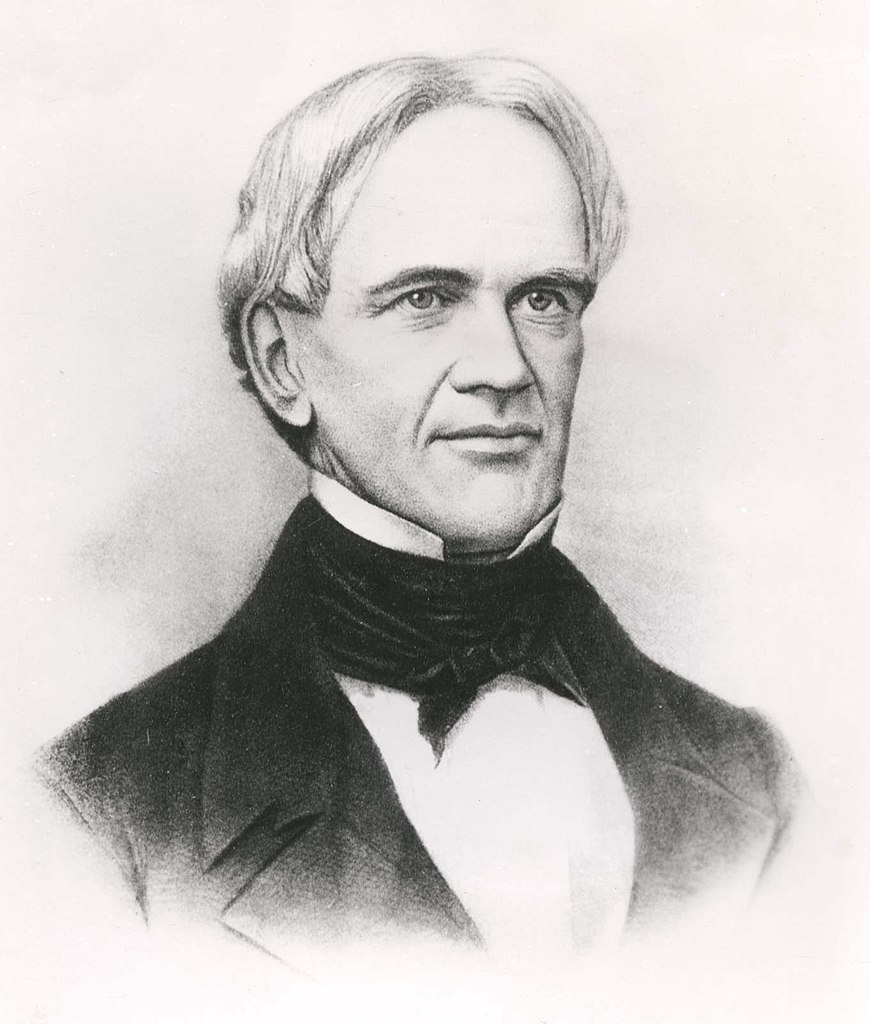
Credit: commons.wikimedia.org
The idea of homework spread across Europe throughout the 19th century.
So who created homework in the United States?
The history of education and homework now moves to Horace Mann (1796—1859), an American educational reformer, spent some time in Prussia. There, he learned more about Germany’s Volksshulen, forms of education , and homework practices.
Mann liked what he saw and brought this system back to America. As a result, homework rapidly became a common factor in students’ lives across the country.
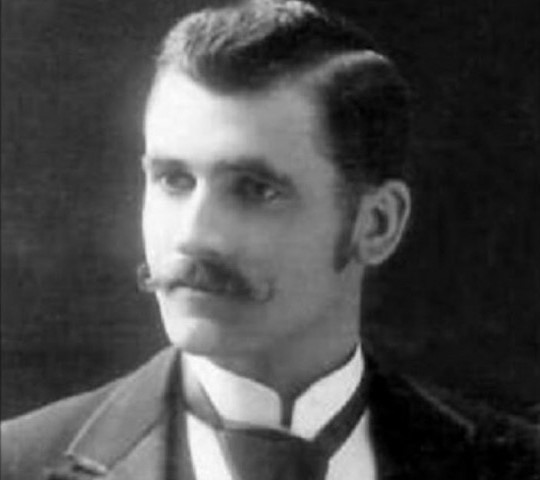
Credit: medium.com
If you’ve ever felt curious about who invented homework, a quick online search might direct you to a man named Roberto Nevilis, a teacher in Venice, Italy.
As the story goes, Nevilis invented homework in 1905 (or 1095) to punish students who didn’t demonstrate a good understanding of the lessons taught during class.
This teaching technique supposedly spread to the rest of Europe before reaching North America.
Unfortunately, there’s little truth to this story. If you dig a little deeper, you’ll find that these online sources lack credible sources to back up this myth as fact.
In 1905, the Roman Empire turned its attention to the First Crusade. No one had time to spare on formalizing education, and classrooms didn’t even exist. So how could Nevilis spread the idea of homework when education remained so informal?
And when you jump to 1901, you’ll discover that the government of California passed a law banning homework for children under fifteen. Nevilis couldn’t have invented homework in 1905 if this law had already reached the United States in 1901.

Inside Creative House/Shutterstock.com
When it comes to the origins of homework, looking at the past shows us that there isn’t one person who created homework. Instead, examining the facts shows us that several people helped to bring the idea of homework into Europe and then the United States.
In addition, the idea of homework extends beyond what historians have discovered. After all, the concept of learning the necessary skills human beings need to survive has existed since the dawn of man.
More than 100 years have come and gone since Horace Mann introduced homework to the school system in the United States.
Therefore, it’s not strange to think that the concept of homework has changed, along with our people and culture.
In short, homework hasn’t always been considered acceptable. Let’s dive into the history or background of homework to learn why.
Homework is Banned! (The 1900s)
Important publications of the time, including the Ladies’ Home Journal and The New York Times, published articles on the negative impacts homework had on American children’s health and well-being.
As a result, California banned homework for children under fifteen in 1901. This law, however, changed again about a decade later (1917).
Children Needed at Home (The 1930s)
Formed in 1923, The American Child Health Association (ACHA) aimed to decrease the infant mortality rate and better support the health and development of the American child.
By the 1930s, ACHA deemed homework a form of child labor. Since the government recently passed laws against child labor , it became difficult to justify homework assignments. College students, however, could still receive homework tasks as part of their formal schooling.

Studio Romantic/Shutterstock.com
A Shift in Ideas (The 1940s—1950s)
During the early to mid-1900s, the United States entered the Progressive Era. As a result, the country reformed its public education system to help improve students’ learning.
Homework became a part of everyday life again. However, this time, the reformed curriculum required teachers to make the assignments more personal.
As a result, American students would write essays on summer vacations and winter breaks, participate in ‘show and tell,’ and more.
These types of assignments still exist today!
Homework Today (The 2000s)
The focus of American education shifted again when the US Department of Education was founded in 1979, aiming to uplevel education in the country by, among other things, prohibiting discrimination ensuring equal access, and highlighting important educational issues.
In 2022, the controversial nature of homework in public schools and formal education is once again a hot topic of discussion in many classrooms.
According to one study , more than 60% of college and high school students deal with mental health issues like depression and anxiety due to homework. In addition, the large number of assignments given to students takes away the time students spend on other interests and hobbies. Homework also negatively impacts sleep.
As a result, some schools have implemented a ban or limit on the amount of homework assigned to students.
Test your knowledge and check out these other facts about homework:
- Horace Mann is also known as the ‘father’ of the modern school system and the educational process that we know today (read more about Who Invented School ).
- With a bit of practice, homework can improve oratory and writing skills. Both are important in a student’s life at all stages.
- Homework can replace studying. Completing regular assignments reduces the time needed to prepare for tests.
- Homework is here to stay. It doesn’t look like teachers will stop assigning homework any time soon. However, the type and quantity of homework given seem to be shifting to accommodate the modern student’s needs.
- The optimal length of time students should spend on homework is one to two hours. Students who spent one to two hours on homework per day scored higher test results.
- So, while completing assignments outside of school hours may be beneficial, spending, for example, a day on homework is not ideal.
Explore how the Findmykids app can complement your child’s school routine. With features designed to ensure their safety and provide peace of mind, it’s a valuable tool for parents looking to stay connected with their children throughout the day. Download now and stay informed about your child’s whereabouts during their academic journey.

Ground Picture/Shutterstock.com
The U.S. Department of Education provides teachers with plenty of information and resources to help students with homework.
In general, teachers give students homework that requires them to employ four strategies. The four types of homework types include:
- Practice: To help students master a specific skill, teachers will assign homework that requires them to repeat the particular skill. For example, students must solve a series of math problems.
- Preparation: This type of homework introduces students to the material they will learn in the future. An example of preparatory homework is assigning students a chapter to read before discussing the contents in class the next day.
- Extension: When a teacher wants to get students to apply what they’ve learned but create a challenge, this type of homework is assigned. It helps to boost problem-solving skills. For example, using a textbook to find the answer to a question gets students to problem-solve differently.
- Integration: To solidify the student learning experience , teachers will create a task that requires the use of many different skills. An example of integration is a book report. Completing integration homework assignments helps students learn how to be organized, plan, strategize, and solve problems on their own. Encouraging effective study habits is a key idea behind homework, too.
Ultimately, the type of homework students receive should have a purpose, be focused and clear, and challenge students to problem solve while integrating lessons learned.
What’s the Purpose of Homework?

LightField Studios/Shutterstock.com
Homework aims to ensure individual students understand the information they learn in class. It also helps teachers to assess a student’s progress and identify strengths and weaknesses.
For example, school teachers use different types of homework like book reports, essays, math problems, and more to help students demonstrate their understanding of the lessons learned.
Does Homework Improve the Quality of Education?
Homework is a controversial topic today. Educators, parents, and even students often question whether homework is beneficial in improving the quality of education.
Let’s explore the pros and cons of homework to try and determine whether homework improves the quality of education in schools.
Homework Pros:
- Time Management Skills : Assigning homework with a due date helps students to develop a schedule to ensure they complete tasks on time. Personal responsibility amongst students is thereby promoted.
- More Time to Learn : Students encounter plenty of distractions at school. It’s also challenging for students to grasp the material in an hour or less. Assigning homework provides the student with the opportunity to understand the material.
- Improves Research Skills : Some homework assignments require students to seek out information. Through homework, students learn where to seek out good, reliable sources.
Homework Cons:
- Reduced Physical Activity : Homework requires students to sit at a desk for long periods. Lack of movement decreases the amount of physical activity, often because teachers assign students so much homework that they don’t have time for anything else. Time for students can get almost totally taken up with out-of-school assignments.
- Stuck on an Assignment: A student often gets stuck on an assignment. Whether they can’t find information or the correct solution, students often don’t have help from parents and require further support from a teacher. For underperforming students, especially, this can have a negative impact on their confidence and overall educational experience.
- Increases Stress : One of the results of getting stuck on an assignment is that it increases stress and anxiety. Too much homework hurts a child’s mental health, preventing them from learning and understanding the material.
Some research shows that homework doesn’t provide educational benefits or improve performance, and can lead to a decline in physical activities. These studies counter that the potential effectiveness of homework is undermined by its negative impact on students.
However, research also shows that homework benefits students—provided teachers don’t give them too much. Here’s a video from Duke Today that highlights a study on the very topic.
Homework Today
The question of “Who Invented Homework?” delves into the historical evolution of academic practices, shedding light on its significance in fostering responsibility among students and contributing to academic progress. While supported by education experts, homework’s role as a pivotal aspect of academic life remains a subject of debate, often criticized as a significant source of stress. Nonetheless, when balanced with extracurricular activities and integrated seamlessly into the learning process, homework continues to shape and refine students’ educational journeys.
Maybe one day, students won’t need to submit assignments or complete tasks at home. But until then, many students understand the benefits of completing homework as it helps them further their education and achieve future career goals.
Before you go, here’s one more question: how do you feel about homework? Do you think teachers assign too little or too much? Get involved and start a discussion in the comments!

Elena Kharichkina/Shutterstock.com
Who invented homework and why?
The creation of homework can be traced back to the Ancient Roman Pliny the Younger, a teacher of oratory—he is generally credited as being the father of homework! Pliny the Younger asked his students to practice outside of class to help them build confidence in their speaking skills.
Who invented homework as a punishment?
There’s a myth that the Italian educator Roberto Nevilis first used homework as a means of punishing his students in the early 20th century—although this has now been widely discredited, and the story of the Italian teacher is regarded as a myth.
Why did homework stop being a punishment?
There are several reasons that homework ceased being a form of punishment. For example, the introduction of child labor laws in the early twentieth century meant that the California education department banned giving homework to children under the age of fifteen for a time. Further, throughout the 1940s and 1950s, there was a growing emphasis on enhancing students’ learning, making homework assignments more personal, and nurturing growth, rather than being used as a form of punishment.
The picture on the front page: Evgeny Atamanenko/Shutterstock.com

With Columbus Day 2022 fast approaching, we thought now is a great time to take…

It’s impossible to overemphasize the importance of learning alphabet letters for kids. This primary milestone…

The topic of tutoring has recently been gaining popularity among parents. Some are dissatisfied with…
Subscribe now!
Glad you've joined us🎉🎉.
PODCAST: HISTORY UNPLUGGED J. Edgar Hoover’s 50-Year Career of Blackmail, Entrapment, and Taking Down Communist Spies
The Encyclopedia: One Book’s Quest to Hold the Sum of All Knowledge PODCAST: HISTORY UNPLUGGED
Free History Worksheets

Here you will find hundreds of free history worksheets designed by professional educators that can be adjusted for elementary, middle, or high school students.
These are nearly 500 student history worksheets in this package that cover all aspects of history, from Ancient Greece to World War One, World War Two, and the Cold War. The worksheets can be modified to accommodate K-12. Please feel free to share these on Pinterest or any other places where teachers’ resources are made available. Included are full-color and black-and-white worksheets, word searches, quizzes, overviews, info graphs, diagrams, anagrams and activity sheets that provide everything you need to teach your class on any time period in history imaginable. Below are listed our currently available free student worksheets. More are to come.
- How Much Can One Individual Alter History? More and Less...
- Why Did Hitler Hate Jews? We Have Some Answers
- Reasons Against Dropping the Atomic Bomb
- Is Russia Communist Today? Find Out Here!
- Phonetic Alphabet: How Soldiers Communicated
- How Many Americans Died in WW2? Here Is A Breakdown
- History Classics
- Your Profile
- Find History on Facebook (Opens in a new window)
- Find History on Twitter (Opens in a new window)
- Find History on YouTube (Opens in a new window)
- Find History on Instagram (Opens in a new window)
- Find History on TikTok (Opens in a new window)
- This Day In History
- History Podcasts
- History Vault
How the Cold War Space Race Led to US Students Doing Tons of Homework
By: Dave Roos
Published: August 13, 2019

Middle-schoolers who trudge home each day with a 50-pound backpack and hours of homework would have had an easier time in 1901. That’s when the anti-homework movement was at its peak and the state of California actually banned all homework for grades below high school.
From the late 19th century through the Great Depression , homework was a popular punching bag of the progressive education movement, a “child-centered” approach championed by psychologist and reformer John Dewey . Not only was homework a waste of time, progressive educators believed, but it was detrimental to children’s health.
By 1948, only 8 percent of American high school students reported studying for two or more hours each night. Homework might have remained in the educational doghouse if not for the arrival of the Cold War , and specifically, the Soviet Union’s launch of Sputnik in 1957.
To the horror of many Americans, the Space Race was being won by communist scientists from the Soviet Union.
“This elicited widespread fear that we were being undone by our schools,” says Steven Schlossman, a historian at Carnegie Mellon University. “How could it be that the Soviets had gotten there faster? They must have better schools that are training their kids to become scientists on a higher level. America now had to integrate schools into our thinking about national defense policy.”

As far as education was concerned, there was plenty of rethinking to do. Around the late 19th century, with the arrival of waves of immigrants, officials had begun shifting public education policies to best serve the rapidly changing face of America.
Until then, Schlossman says most schoolwork revolved around drill, memorization and recitation. Kids were expected to “say their lessons,” which meant memorizing long passages of history texts and poetry, drilling math problems, and reciting it all out loud in class. All of that memorization and recitation meant hours of practice at home every night. But as America and its students became more diverse, the rigidity of rote memorization seemed insufficient.
If schools were going to offer equal education opportunities for all students, they needed to do it scientifically, and the leading educational minds of the day were fascinated with the emerging fields of psychology and child development.

Progressive's Push Against Homework
Popular turn-of-the-century women’s magazines like The Ladies Home Journal published studies showing that drilling of spelling words didn’t improve children’s overall spelling ability, and its editors promoted more “natural” patterns of child learning and growth. These new ideas about what’s best for kids’ education were picked up by organizations like the National Congress of Mothers, a group formed in 1897 that would become the National Parent Teachers Association (PTA).
It didn’t take long for this increasingly vocal movement of child psychologists and concerned moms to identify public enemy number one.
“The first thing that had to be changed in schooling was this old-fashioned way of doing homework, which was antithetical to children’s natural growth qualities,” says Schlossman. “Homework took on a broader symbolic meaning for ‘out with the old and in with the new.’”
That’s why the California legislature voted in 1901 to abolish all homework for students 14 and younger, a move followed by dozens of large cities and school districts across the country.
The anti-homework argument of the progressive education movement further contended that hours of homework robbed children of outdoor play, considered essential to healthy physical and emotional development.
“For the elementary school child and the junior high school child,” concluded a 1930s study , homework was nothing less than “legalized criminality.” The American Child Health Association equated homework with child labor in 1930, claiming that both practices were “chief causes of the high death and morbidity rates from tuberculosis and heart disease among adolescents.”
By the 1940s, nightly homework levels had dropped to all-time lows.

HISTORY Vault: Top Secret Missions of the CIA
Explore espionage exploits from the files of the CIA.
More Americans Finish High School During Great Depression
But then came World War II and another set of demographic and societal shifts that would again demand changes in American public education. Starting with the Great Depression when jobs were scarce, more American kids started staying in school through high school, and with the post-war baby boom , unprecedented numbers of students entered the nation’s school systems with expectations of reaching high school and beyond.
“High school was now for everybody,” says Schlossman. “This is really important. The idea of a high-school education as a ladder for success really takes root in post-World War II period.”
Even before Cold War anxieties kicked in in the 1950s, there was a growing sentiment among educators that the high-school curriculum needed an upgrade. Standards needed to be raised and teaching methods rethought. If more kids planned on going to college, homework would have to be part of the equation.
But no single event rocketed homework back into the national conversation quite like the launching of Sputnik 1, humankind’s first artificial satellite to reach Earth’s orbit. The response from the U.S. federal government was swift. In 1958, just a year after Sputnik, Congress passed the National Defense Education Act (NDEA), a $1-billion spending package to bolster high-quality teaching and learning in science, mathematics and foreign languages.

A report from the House of Representatives supporting passage of the NDEA read: “It is no exaggeration to say that America’s progress in many fields of endeavor in the years ahead—in fact, the very survival of our free country—may depend in large part upon the education we provide for our young people now.”
Funding from the NDEA helped develop ambitious new high school curriculums, including what became known as the “new math.” Top academics, scientists and educational psychologists teamed up to create a new American public education mandate that would later be called the “academic excellence” movement. And homework was front and center.
Just as the academic excellence movement promoted a deeper and more hands-on approach to math and science in the classroom, homework at all levels had to be more than memorization and mindless drills. It needed to promote creative problem-solving and analytical thinking.
The NDEA investment had immediate effects. By 1962, 23 percent of high-school juniors reported doing two or more hours of homework a night, nearly twice as many as in 1957, the year of Sputnik.
Still, the Sputnik homework bump didn’t last long. The counterculture movement of the late 1960s encouraged students to question authority, and nothing sticks it to “the man” quite like skipping your homework. By 1972, the percentage of high-schoolers doing two or more hours of homework a day dropped back below 10 percent.
Homework Drive Revived Under Reagan
There was another attempt in the early 1980s to revive homework as part of a second-wave academic excellence movement under the Reagan administration. A report called A Nation at Risk warned in Cold-War terms of the potential fallout from a failed education system.
“...[T]he educational foundations of our society are presently being eroded by a rising tide of mediocrity that threatens our very future as a Nation and a people,” wrote the report’s authors.
Schlossman says that this second academic excellence push did little to move the needle significantly on homework, flattening out at around 12 percent of high-schoolers clocking two or more hours a day by the mid-1980s.
“The homework movement of the 1980s was cast as a character reform movement, almost like a moral enterprise,” says Schlossman. “It didn’t have the intellectual expectations of the 1950s and 1960s.”
In more recent times, a 2016 analysis by the National Center for Education Statistics found that U.S. high school students spent an average of 7.5 hours on homework each week—averaging about 1.5 hours per day. While that was up from an average of 6.6 hours in 2012, it remained an easier lift that what students took on during the heady days of the Cold War.

Sign up for Inside History
Get HISTORY’s most fascinating stories delivered to your inbox three times a week.
By submitting your information, you agree to receive emails from HISTORY and A+E Networks. You can opt out at any time. You must be 16 years or older and a resident of the United States.
More details : Privacy Notice | Terms of Use | Contact Us

Online GCSE History knowledge tests + instant gap analysis
Historyhomework.com provides Edexcel and AQA GCSE history knowledge tests. Covering many units from the specification the tests cover all of the four GCSE Assessment Objectives.
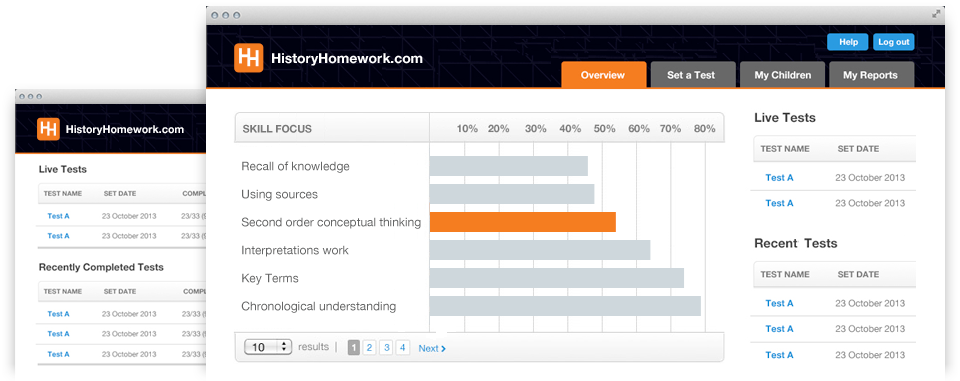
How HistoryHomework.com works...
1. choose a test.
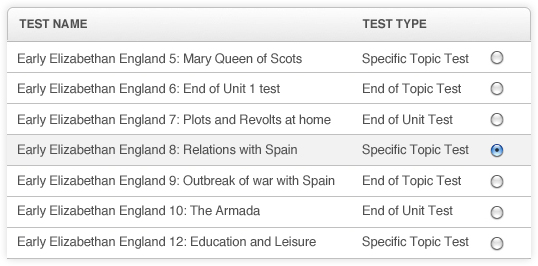
2. Choose the students
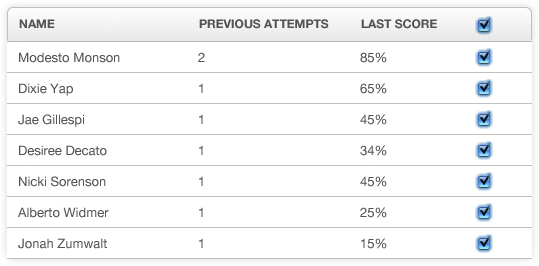
3. Students take the test
Each historyhomework.com test includes a variety of question types including ‘fill the gap’ and ‘match the definition’ as well as tick and multi-choice questions. The questions are designed to assess your students’ substantive and disciplinary knowledge. Questions also check your class’s ability to understand key terms, decode examination questions and assess their chronological understanding.
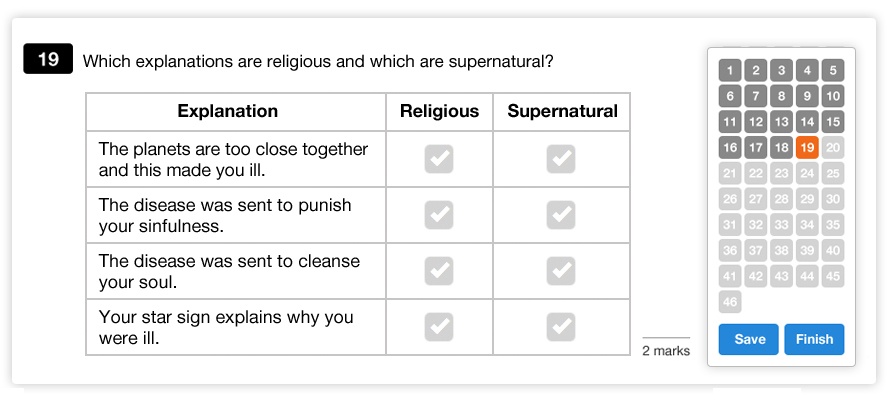
4. Class gap analysis
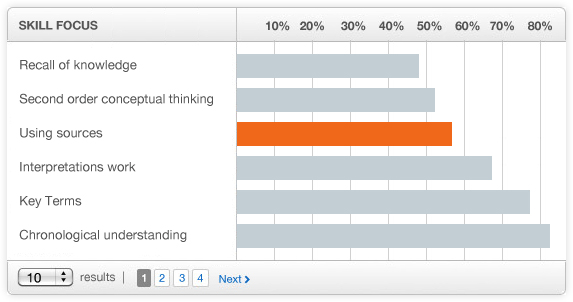
5. Individual analysis
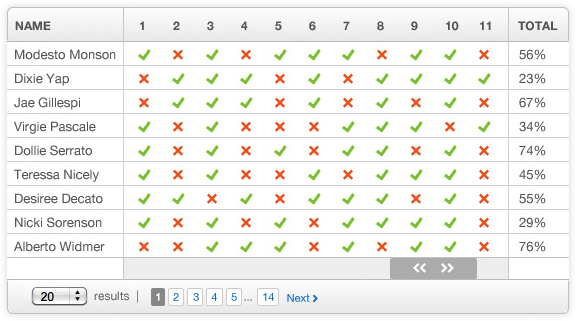
Register with HistoryHomework.com You can't go wrong!
How many student accounts?
The Cult of Homework
America’s devotion to the practice stems in part from the fact that it’s what today’s parents and teachers grew up with themselves.

America has long had a fickle relationship with homework. A century or so ago, progressive reformers argued that it made kids unduly stressed , which later led in some cases to district-level bans on it for all grades under seventh. This anti-homework sentiment faded, though, amid mid-century fears that the U.S. was falling behind the Soviet Union (which led to more homework), only to resurface in the 1960s and ’70s, when a more open culture came to see homework as stifling play and creativity (which led to less). But this didn’t last either: In the ’80s, government researchers blamed America’s schools for its economic troubles and recommended ramping homework up once more.
The 21st century has so far been a homework-heavy era, with American teenagers now averaging about twice as much time spent on homework each day as their predecessors did in the 1990s . Even little kids are asked to bring school home with them. A 2015 study , for instance, found that kindergarteners, who researchers tend to agree shouldn’t have any take-home work, were spending about 25 minutes a night on it.
But not without pushback. As many children, not to mention their parents and teachers, are drained by their daily workload, some schools and districts are rethinking how homework should work—and some teachers are doing away with it entirely. They’re reviewing the research on homework (which, it should be noted, is contested) and concluding that it’s time to revisit the subject.
Read: My daughter’s homework is killing me
Hillsborough, California, an affluent suburb of San Francisco, is one district that has changed its ways. The district, which includes three elementary schools and a middle school, worked with teachers and convened panels of parents in order to come up with a homework policy that would allow students more unscheduled time to spend with their families or to play. In August 2017, it rolled out an updated policy, which emphasized that homework should be “meaningful” and banned due dates that fell on the day after a weekend or a break.
“The first year was a bit bumpy,” says Louann Carlomagno, the district’s superintendent. She says the adjustment was at times hard for the teachers, some of whom had been doing their job in a similar fashion for a quarter of a century. Parents’ expectations were also an issue. Carlomagno says they took some time to “realize that it was okay not to have an hour of homework for a second grader—that was new.”
Most of the way through year two, though, the policy appears to be working more smoothly. “The students do seem to be less stressed based on conversations I’ve had with parents,” Carlomagno says. It also helps that the students performed just as well on the state standardized test last year as they have in the past.
Earlier this year, the district of Somerville, Massachusetts, also rewrote its homework policy, reducing the amount of homework its elementary and middle schoolers may receive. In grades six through eight, for example, homework is capped at an hour a night and can only be assigned two to three nights a week.
Jack Schneider, an education professor at the University of Massachusetts at Lowell whose daughter attends school in Somerville, is generally pleased with the new policy. But, he says, it’s part of a bigger, worrisome pattern. “The origin for this was general parental dissatisfaction, which not surprisingly was coming from a particular demographic,” Schneider says. “Middle-class white parents tend to be more vocal about concerns about homework … They feel entitled enough to voice their opinions.”
Schneider is all for revisiting taken-for-granted practices like homework, but thinks districts need to take care to be inclusive in that process. “I hear approximately zero middle-class white parents talking about how homework done best in grades K through two actually strengthens the connection between home and school for young people and their families,” he says. Because many of these parents already feel connected to their school community, this benefit of homework can seem redundant. “They don’t need it,” Schneider says, “so they’re not advocating for it.”
That doesn’t mean, necessarily, that homework is more vital in low-income districts. In fact, there are different, but just as compelling, reasons it can be burdensome in these communities as well. Allison Wienhold, who teaches high-school Spanish in the small town of Dunkerton, Iowa, has phased out homework assignments over the past three years. Her thinking: Some of her students, she says, have little time for homework because they’re working 30 hours a week or responsible for looking after younger siblings.
As educators reduce or eliminate the homework they assign, it’s worth asking what amount and what kind of homework is best for students. It turns out that there’s some disagreement about this among researchers, who tend to fall in one of two camps.
In the first camp is Harris Cooper, a professor of psychology and neuroscience at Duke University. Cooper conducted a review of the existing research on homework in the mid-2000s , and found that, up to a point, the amount of homework students reported doing correlates with their performance on in-class tests. This correlation, the review found, was stronger for older students than for younger ones.
This conclusion is generally accepted among educators, in part because it’s compatible with “the 10-minute rule,” a rule of thumb popular among teachers suggesting that the proper amount of homework is approximately 10 minutes per night, per grade level—that is, 10 minutes a night for first graders, 20 minutes a night for second graders, and so on, up to two hours a night for high schoolers.
In Cooper’s eyes, homework isn’t overly burdensome for the typical American kid. He points to a 2014 Brookings Institution report that found “little evidence that the homework load has increased for the average student”; onerous amounts of homework, it determined, are indeed out there, but relatively rare. Moreover, the report noted that most parents think their children get the right amount of homework, and that parents who are worried about under-assigning outnumber those who are worried about over-assigning. Cooper says that those latter worries tend to come from a small number of communities with “concerns about being competitive for the most selective colleges and universities.”
According to Alfie Kohn, squarely in camp two, most of the conclusions listed in the previous three paragraphs are questionable. Kohn, the author of The Homework Myth: Why Our Kids Get Too Much of a Bad Thing , considers homework to be a “reliable extinguisher of curiosity,” and has several complaints with the evidence that Cooper and others cite in favor of it. Kohn notes, among other things, that Cooper’s 2006 meta-analysis doesn’t establish causation, and that its central correlation is based on children’s (potentially unreliable) self-reporting of how much time they spend doing homework. (Kohn’s prolific writing on the subject alleges numerous other methodological faults.)
In fact, other correlations make a compelling case that homework doesn’t help. Some countries whose students regularly outperform American kids on standardized tests, such as Japan and Denmark, send their kids home with less schoolwork , while students from some countries with higher homework loads than the U.S., such as Thailand and Greece, fare worse on tests. (Of course, international comparisons can be fraught because so many factors, in education systems and in societies at large, might shape students’ success.)
Kohn also takes issue with the way achievement is commonly assessed. “If all you want is to cram kids’ heads with facts for tomorrow’s tests that they’re going to forget by next week, yeah, if you give them more time and make them do the cramming at night, that could raise the scores,” he says. “But if you’re interested in kids who know how to think or enjoy learning, then homework isn’t merely ineffective, but counterproductive.”
His concern is, in a way, a philosophical one. “The practice of homework assumes that only academic growth matters, to the point that having kids work on that most of the school day isn’t enough,” Kohn says. What about homework’s effect on quality time spent with family? On long-term information retention? On critical-thinking skills? On social development? On success later in life? On happiness? The research is quiet on these questions.
Another problem is that research tends to focus on homework’s quantity rather than its quality, because the former is much easier to measure than the latter. While experts generally agree that the substance of an assignment matters greatly (and that a lot of homework is uninspiring busywork), there isn’t a catchall rule for what’s best—the answer is often specific to a certain curriculum or even an individual student.
Given that homework’s benefits are so narrowly defined (and even then, contested), it’s a bit surprising that assigning so much of it is often a classroom default, and that more isn’t done to make the homework that is assigned more enriching. A number of things are preserving this state of affairs—things that have little to do with whether homework helps students learn.
Jack Schneider, the Massachusetts parent and professor, thinks it’s important to consider the generational inertia of the practice. “The vast majority of parents of public-school students themselves are graduates of the public education system,” he says. “Therefore, their views of what is legitimate have been shaped already by the system that they would ostensibly be critiquing.” In other words, many parents’ own history with homework might lead them to expect the same for their children, and anything less is often taken as an indicator that a school or a teacher isn’t rigorous enough. (This dovetails with—and complicates—the finding that most parents think their children have the right amount of homework.)
Barbara Stengel, an education professor at Vanderbilt University’s Peabody College, brought up two developments in the educational system that might be keeping homework rote and unexciting. The first is the importance placed in the past few decades on standardized testing, which looms over many public-school classroom decisions and frequently discourages teachers from trying out more creative homework assignments. “They could do it, but they’re afraid to do it, because they’re getting pressure every day about test scores,” Stengel says.
Second, she notes that the profession of teaching, with its relatively low wages and lack of autonomy, struggles to attract and support some of the people who might reimagine homework, as well as other aspects of education. “Part of why we get less interesting homework is because some of the people who would really have pushed the limits of that are no longer in teaching,” she says.
“In general, we have no imagination when it comes to homework,” Stengel says. She wishes teachers had the time and resources to remake homework into something that actually engages students. “If we had kids reading—anything, the sports page, anything that they’re able to read—that’s the best single thing. If we had kids going to the zoo, if we had kids going to parks after school, if we had them doing all of those things, their test scores would improve. But they’re not. They’re going home and doing homework that is not expanding what they think about.”
“Exploratory” is one word Mike Simpson used when describing the types of homework he’d like his students to undertake. Simpson is the head of the Stone Independent School, a tiny private high school in Lancaster, Pennsylvania, that opened in 2017. “We were lucky to start a school a year and a half ago,” Simpson says, “so it’s been easy to say we aren’t going to assign worksheets, we aren’t going assign regurgitative problem sets.” For instance, a half-dozen students recently built a 25-foot trebuchet on campus.
Simpson says he thinks it’s a shame that the things students have to do at home are often the least fulfilling parts of schooling: “When our students can’t make the connection between the work they’re doing at 11 o’clock at night on a Tuesday to the way they want their lives to be, I think we begin to lose the plot.”
When I talked with other teachers who did homework makeovers in their classrooms, I heard few regrets. Brandy Young, a second-grade teacher in Joshua, Texas, stopped assigning take-home packets of worksheets three years ago, and instead started asking her students to do 20 minutes of pleasure reading a night. She says she’s pleased with the results, but she’s noticed something funny. “Some kids,” she says, “really do like homework.” She’s started putting out a bucket of it for students to draw from voluntarily—whether because they want an additional challenge or something to pass the time at home.
Chris Bronke, a high-school English teacher in the Chicago suburb of Downers Grove, told me something similar. This school year, he eliminated homework for his class of freshmen, and now mostly lets students study on their own or in small groups during class time. It’s usually up to them what they work on each day, and Bronke has been impressed by how they’ve managed their time.
In fact, some of them willingly spend time on assignments at home, whether because they’re particularly engaged, because they prefer to do some deeper thinking outside school, or because they needed to spend time in class that day preparing for, say, a biology test the following period. “They’re making meaningful decisions about their time that I don’t think education really ever gives students the experience, nor the practice, of doing,” Bronke said.
The typical prescription offered by those overwhelmed with homework is to assign less of it—to subtract. But perhaps a more useful approach, for many classrooms, would be to create homework only when teachers and students believe it’s actually needed to further the learning that takes place in class—to start with nothing, and add as necessary.
Homework in America
- 2014 Brown Center Report on American Education
Subscribe to the Brown Center on Education Policy Newsletter
Tom loveless tom loveless former brookings expert @tomloveless99.
March 18, 2014
- 18 min read
Part II of the 2014 Brown Center Report on American Education

Homework! The topic, no, just the word itself, sparks controversy. It has for a long time. In 1900, Edward Bok, editor of the Ladies Home Journal , published an impassioned article, “A National Crime at the Feet of Parents,” accusing homework of destroying American youth. Drawing on the theories of his fellow educational progressive, psychologist G. Stanley Hall (who has since been largely discredited), Bok argued that study at home interfered with children’s natural inclination towards play and free movement, threatened children’s physical and mental health, and usurped the right of parents to decide activities in the home.
The Journal was an influential magazine, especially with parents. An anti-homework campaign burst forth that grew into a national crusade. [i] School districts across the land passed restrictions on homework, culminating in a 1901 statewide prohibition of homework in California for any student under the age of 15. The crusade would remain powerful through 1913, before a world war and other concerns bumped it from the spotlight. Nevertheless, anti-homework sentiment would remain a touchstone of progressive education throughout the twentieth century. As a political force, it would lie dormant for years before bubbling up to mobilize proponents of free play and “the whole child.” Advocates would, if educators did not comply, seek to impose homework restrictions through policy making.
Our own century dawned during a surge of anti-homework sentiment. From 1998 to 2003, Newsweek , TIME , and People , all major national publications at the time, ran cover stories on the evils of homework. TIME ’s 1999 story had the most provocative title, “The Homework Ate My Family: Kids Are Dazed, Parents Are Stressed, Why Piling On Is Hurting Students.” People ’s 2003 article offered a call to arms: “Overbooked: Four Hours of Homework for a Third Grader? Exhausted Kids (and Parents) Fight Back.” Feature stories about students laboring under an onerous homework burden ran in newspapers from coast to coast. Photos of angst ridden children became a journalistic staple.
The 2003 Brown Center Report on American Education included a study investigating the homework controversy. Examining the most reliable empirical evidence at the time, the study concluded that the dramatic claims about homework were unfounded. An overwhelming majority of students, at least two-thirds, depending on age, had an hour or less of homework each night. Surprisingly, even the homework burden of college-bound high school seniors was discovered to be rather light, less than an hour per night or six hours per week. Public opinion polls also contradicted the prevailing story. Parents were not up in arms about homework. Most said their children’s homework load was about right. Parents wanting more homework out-numbered those who wanted less.
Now homework is in the news again. Several popular anti-homework books fill store shelves (whether virtual or brick and mortar). [ii] The documentary Race to Nowhere depicts homework as one aspect of an overwrought, pressure-cooker school system that constantly pushes students to perform and destroys their love of learning. The film’s website claims over 6,000 screenings in more than 30 countries. In 2011, the New York Times ran a front page article about the homework restrictions adopted by schools in Galloway, NJ, describing “a wave of districts across the nation trying to remake homework amid concerns that high stakes testing and competition for college have fueled a nightly grind that is stressing out children and depriving them of play and rest, yet doing little to raise achievement, especially in elementary grades.” In the article, Vicki Abeles, the director of Race to Nowhere , invokes the indictment of homework lodged a century ago, declaring, “The presence of homework is negatively affecting the health of our young people and the quality of family time.” [iii]
A petition for the National PTA to adopt “healthy homework guidelines” on change.org currently has 19,000 signatures. In September 2013, Atlantic featured an article, “My Daughter’s Homework is Killing Me,” by a Manhattan writer who joined his middle school daughter in doing her homework for a week. Most nights the homework took more than three hours to complete.
The Current Study
A decade has passed since the last Brown Center Report study of homework, and it’s time for an update. How much homework do American students have today? Has the homework burden increased, gone down, or remained about the same? What do parents think about the homework load?
A word on why such a study is important. It’s not because the popular press is creating a fiction. The press accounts are built on the testimony of real students and real parents, people who are very unhappy with the amount of homework coming home from school. These unhappy people are real—but they also may be atypical. Their experiences, as dramatic as they are, may not represent the common experience of American households with school-age children. In the analysis below, data are analyzed from surveys that are methodologically designed to produce reliable information about the experiences of all Americans. Some of the surveys have existed long enough to illustrate meaningful trends. The question is whether strong empirical evidence confirms the anecdotes about overworked kids and outraged parents.
Data from the National Assessment of Educational Progress (NAEP) provide a good look at trends in homework for nearly the past three decades. Table 2-1 displays NAEP data from 1984-2012. The data are from the long-term trend NAEP assessment’s student questionnaire, a survey of homework practices featuring both consistently-worded questions and stable response categories. The question asks: “How much time did you spend on homework yesterday?” Responses are shown for NAEP’s three age groups: 9, 13, and 17. [iv]
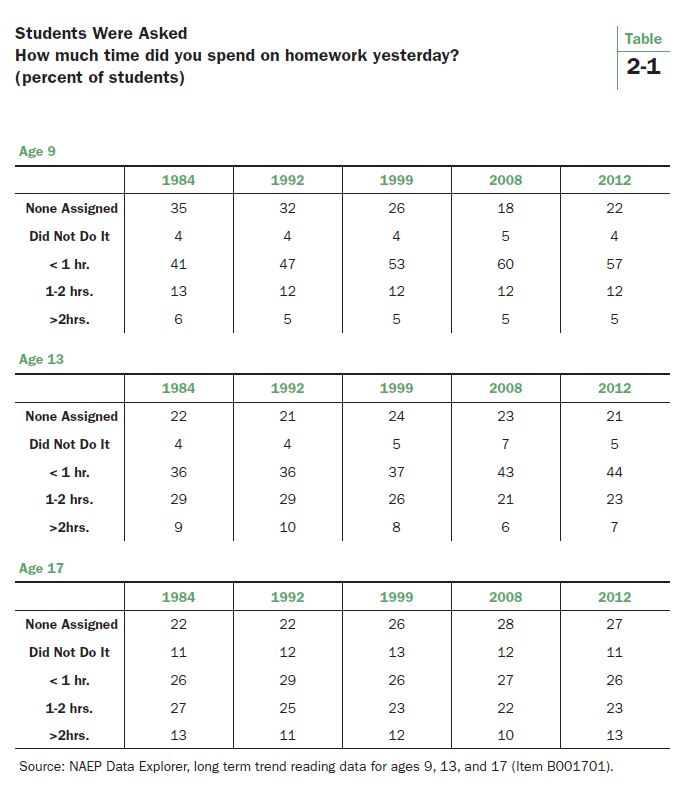
Today’s youngest students seem to have more homework than in the past. The first three rows of data for age 9 reveal a shift away from students having no homework, declining from 35% in 1984 to 22% in 2012. A slight uptick occurred from the low of 18% in 2008, however, so the trend may be abating. The decline of the “no homework” group is matched by growth in the percentage of students with less than an hour’s worth, from 41% in 1984 to 57% in 2012. The share of students with one to two hours of homework changed very little over the entire 28 years, comprising 12% of students in 2012. The group with the heaviest load, more than two hours of homework, registered at 5% in 2012. It was 6% in 1984.
The amount of homework for 13-year-olds appears to have lightened slightly. Students with one to two hours of homework declined from 29% to 23%. The next category down (in terms of homework load), students with less than an hour, increased from 36% to 44%. One can see, by combining the bottom two rows, that students with an hour or more of homework declined steadily from 1984 to 2008 (falling from 38% to 27%) and then ticked up to 30% in 2012. The proportion of students with the heaviest load, more than two hours, slipped from 9% in 1984 to 7% in 2012 and ranged between 7-10% for the entire period.
For 17-year-olds, the homework burden has not varied much. The percentage of students with no homework has increased from 22% to 27%. Most of that gain occurred in the 1990s. Also note that the percentage of 17-year-olds who had homework but did not do it was 11% in 2012, the highest for the three NAEP age groups. Adding that number in with the students who didn’t have homework in the first place means that more than one-third of seventeen year olds (38%) did no homework on the night in question in 2012. That compares with 33% in 1984. The segment of the 17-year-old population with more than two hours of homework, from which legitimate complaints of being overworked might arise, has been stuck in the 10%-13% range.
The NAEP data point to four main conclusions:
- With one exception, the homework load has remained remarkably stable since 1984.
- The exception is nine-year-olds. They have experienced an increase in homework, primarily because many students who once did not have any now have some. The percentage of nine-year-olds with no homework fell by 13 percentage points, and the percentage with less than an hour grew by 16 percentage points.
- Of the three age groups, 17-year-olds have the most bifurcated distribution of the homework burden. They have the largest percentage of kids with no homework (especially when the homework shirkers are added in) and the largest percentage with more than two hours.
- NAEP data do not support the idea that a large and growing number of students have an onerous amount of homework. For all three age groups, only a small percentage of students report more than two hours of homework. For 1984-2012, the size of the two hours or more groups ranged from 5-6% for age 9, 6-10% for age 13, and 10-13% for age 17.
Note that the item asks students how much time they spent on homework “yesterday.” That phrasing has the benefit of immediacy, asking for an estimate of precise, recent behavior rather than an estimate of general behavior for an extended, unspecified period. But misleading responses could be generated if teachers lighten the homework of NAEP participants on the night before the NAEP test is given. That’s possible. [v] Such skewing would not affect trends if it stayed about the same over time and in the same direction (teachers assigning less homework than usual on the day before NAEP). Put another way, it would affect estimates of the amount of homework at any single point in time but not changes in the amount of homework between two points in time.
A check for possible skewing is to compare the responses above with those to another homework question on the NAEP questionnaire from 1986-2004 but no longer in use. [vi] It asked students, “How much time do you usually spend on homework each day?” Most of the response categories have different boundaries from the “last night” question, making the data incomparable. But the categories asking about no homework are comparable. Responses indicating no homework on the “usual” question in 2004 were: 2% for age 9-year-olds, 5% for 13 year olds, and 12% for 17-year-olds. These figures are much less than the ones reported in Table 2-1 above. The “yesterday” data appear to overstate the proportion of students typically receiving no homework.
The story is different for the “heavy homework load” response categories. The “usual” question reported similar percentages as the “yesterday” question. The categories representing the most amount of homework were “more than one hour” for age 9 and “more than two hours” for ages 13 and 17. In 2004, 12% of 9-year-olds said they had more than one hour of daily homework, while 8% of 13-year-olds and 12% of 17-year-olds said they had more than two hours. For all three age groups, those figures declined from1986 to 2004. The decline for age 17 was quite large, falling from 17% in 1986 to 12% in 2004.
The bottom line: regardless of how the question is posed, NAEP data do not support the view that the homework burden is growing, nor do they support the belief that the proportion of students with a lot of homework has increased in recent years. The proportion of students with no homework is probably under-reported on the long-term trend NAEP. But the upper bound of students with more than two hours of daily homework appears to be about 15%–and that is for students in their final years of high school.
College Freshmen Look Back
There is another good source of information on high school students’ homework over several decades. The Higher Education Research Institute at UCLA conducts an annual survey of college freshmen that began in 1966. In 1986, the survey started asking a series of questions regarding how students spent time in the final year of high school. Figure 2-1 shows the 2012 percentages for the dominant activities. More than half of college freshmen say they spent at least six hours per week socializing with friends (66.2%) and exercising/sports (53.0%). About 40% devoted that much weekly time to paid employment.
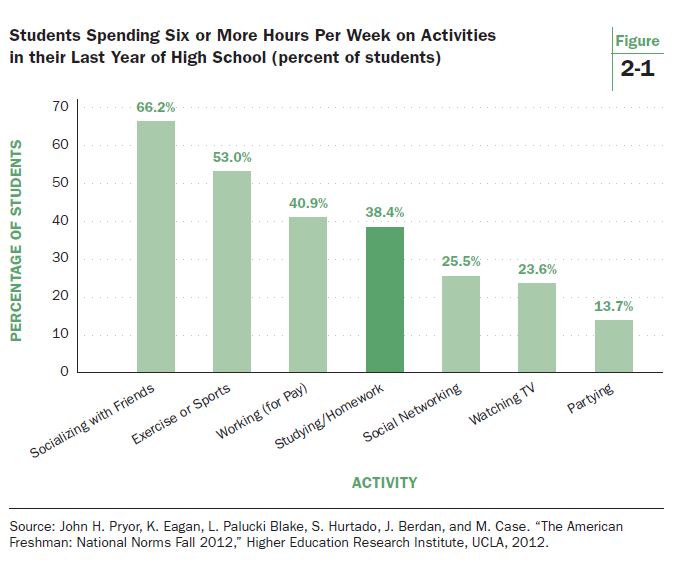
Homework comes in fourth pace. Only 38.4% of students said they spent at least six hours per week studying or doing homework. When these students were high school seniors, it was not an activity central to their out of school lives. That is quite surprising. Think about it. The survey is confined to the nation’s best students, those attending college. Gone are high school dropouts. Also not included are students who go into the military or attain full time employment immediately after high school. And yet only a little more than one-third of the sampled students, devoted more than six hours per week to homework and studying when they were on the verge of attending college.
Another notable finding from the UCLA survey is how the statistic is trending (see Figure 2-2). In 1986, 49.5% reported spending six or more hours per week studying and doing homework. By 2002, the proportion had dropped to 33.4%. In 2012, as noted in Figure 2-1, the statistic had bounced off the historical lows to reach 38.4%. It is slowly rising but still sits sharply below where it was in 1987.

What Do Parents Think?
Met Life has published an annual survey of teachers since 1984. In 1987 and 2007, the survey included questions focusing on homework and expanded to sample both parents and students on the topic. Data are broken out for secondary and elementary parents and for students in grades 3-6 and grades 7-12 (the latter not being an exact match with secondary parents because of K-8 schools).
Table 2-2 shows estimates of homework from the 2007 survey. Respondents were asked to estimate the amount of homework on a typical school day (Monday-Friday). The median estimate of each group of respondents is shaded. As displayed in the first column, the median estimate for parents of an elementary student is that their child devotes about 30 minutes to homework on the typical weekday. Slightly more than half (52%) estimate 30 minutes or less; 48% estimate 45 minutes or more. Students in grades 3-6 (third column) give a median estimate that is a bit higher than their parents’ (45 minutes), with almost two-thirds (63%) saying 45 minutes or less is the typical weekday homework load.
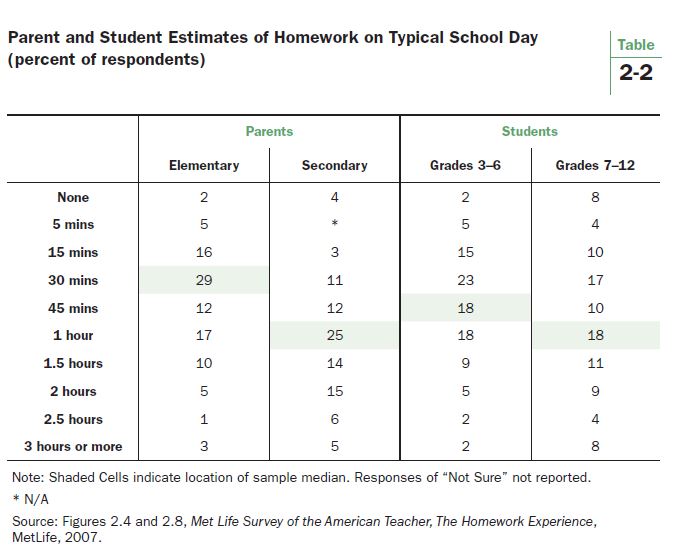
One hour of homework is the median estimate for both secondary parents and students in grade 7-12, with 55% of parents reporting an hour or less and about two-thirds (67%) of students reporting the same. As for the prevalence of the heaviest homework loads, 11% of secondary parents say their children spend more than two hours on weekday homework, and 12% is the corresponding figure for students in grades 7-12.
The Met Life surveys in 1987 and 2007 asked parents to evaluate the amount and quality of homework. Table 2-3 displays the results. There was little change over the two decades separating the two surveys. More than 60% of parents rate the amount of homework as good or excellent, and about two-thirds give such high ratings to the quality of the homework their children are receiving. The proportion giving poor ratings to either the quantity or quality of homework did not exceed 10% on either survey.
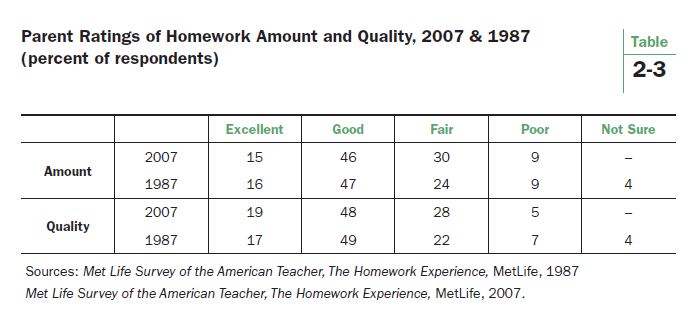
Parental dissatisfaction with homework comes in two forms: those who feel schools give too much homework and those who feel schools do not give enough. The current wave of journalism about unhappy parents is dominated by those who feel schools give too much homework. How big is this group? Not very big (see Figure 2-3). On the Met Life survey, 60% of parents felt schools were giving the right amount of homework, 25% wanted more homework, and only 15% wanted less.
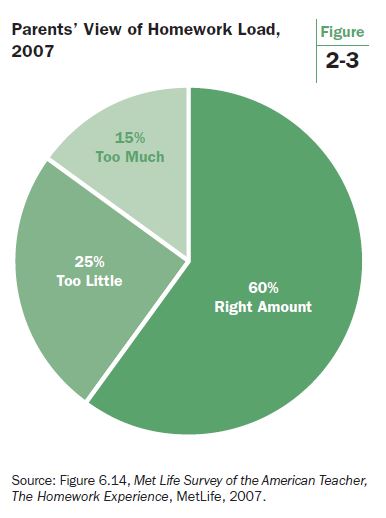
National surveys on homework are infrequent, but the 2006-2007 period had more than one. A poll conducted by Public Agenda in 2006 reported similar numbers as the Met Life survey: 68% of parents describing the homework load as “about right,” 20% saying there is “too little homework,” and 11% saying there is “too much homework.” A 2006 AP-AOL poll found the highest percentage of parents reporting too much homework, 19%. But even in that poll, they were outnumbered by parents believing there is too little homework (23%), and a clear majority (57%) described the load as “about right.” A 2010 local survey of Chicago parents conducted by the Chicago Tribune reported figures similar to those reported above: approximately two-thirds of parents saying their children’s homework load is “about right,” 21% saying it’s not enough, and 12% responding that the homework load is too much.
Summary and Discussion
In recent years, the press has been filled with reports of kids over-burdened with homework and parents rebelling against their children’s oppressive workload. The data assembled above call into question whether that portrait is accurate for the typical American family. Homework typically takes an hour per night. The homework burden of students rarely exceeds two hours a night. The upper limit of students with two or more hours per night is about 15% nationally—and that is for juniors or seniors in high school. For younger children, the upper boundary is about 10% who have such a heavy load. Polls show that parents who want less homework range from 10%-20%, and that they are outnumbered—in every national poll on the homework question—by parents who want more homework, not less. The majority of parents describe their children’s homework burden as about right.
So what’s going on? Where are the homework horror stories coming from?
The Met Life survey of parents is able to give a few hints, mainly because of several questions that extend beyond homework to other aspects of schooling. The belief that homework is burdensome is more likely held by parents with a larger set of complaints and concerns. They are alienated from their child’s school. About two in five parents (19%) don’t believe homework is important. Compared to other parents, these parents are more likely to say too much homework is assigned (39% vs. 9%), that what is assigned is just busywork (57% vs. 36%), and that homework gets in the way of their family spending time together (51% vs. 15%). They are less likely to rate the quality of homework as excellent (3% vs. 23%) or to rate the availability and responsiveness of teachers as excellent (18% vs. 38%). [vii]
They can also convince themselves that their numbers are larger than they really are. Karl Taro Greenfeld, the author of the Atlantic article mentioned above, seems to fit that description. “Every parent I know in New York City comments on how much homework their children have,” Mr. Greenfeld writes. As for those parents who do not share this view? “There is always a clique of parents who are happy with the amount of homework. In fact, they would prefer more . I tend not to get along with that type of parent.” [viii]
Mr. Greenfeld’s daughter attends a selective exam school in Manhattan, known for its rigorous expectations and, yes, heavy homework load. He had also complained about homework in his daughter’s previous school in Brentwood, CA. That school was a charter school. After Mr. Greenfeld emailed several parents expressing his complaints about homework in that school, the school’s vice-principal accused Mr. Greenfeld of cyberbullying. The lesson here is that even schools of choice are not immune from complaints about homework.
The homework horror stories need to be read in a proper perspective. They seem to originate from the very personal discontents of a small group of parents. They do not reflect the experience of the average family with a school-age child. That does not diminish these stories’ power to command the attention of school officials or even the public at large. But it also suggests a limited role for policy making in settling such disputes. Policy is a blunt instrument. Educators, parents, and kids are in the best position to resolve complaints about homework on a case by case basis. Complaints about homework have existed for more than a century, and they show no signs of going away.
Part II Notes:
[i]Brian Gill and Steven Schlossman, “A Sin Against Childhood: Progressive Education and the Crusade to Abolish Homework, 1897-1941,” American Journal of Education , vol. 105, no. 1 (Nov., 1996), 27-66. Also see Brian P. Gill and Steven L. Schlossman, “Villain or Savior? The American Discourse on Homework, 1850-2003,” Theory into Practice , 43, 3 (Summer 2004), pp. 174-181.
[ii] Bennett, Sara, and Nancy Kalish. The Case Against Homework: How Homework Is Hurting Our Children and What We Can Do About It (New York: Crown, 2006). Buell, John. Closing the Book on Homework: Enhancing Public Education and Freeing Family Time . (Philadelphia: Temple University Press, 2004). Kohn, Alfie. The Homework Myth: Why Our Kids Get Too Much of a Bad Thing (Cambridge, MA: Da Capo Press, 2006). Kralovec, Etta, and John Buell. The End of Homework: How Homework Disrupts Families, Overburdens Children, and Limits Learning (Boston: Beacon Press, 2000).
[iii] Hu, Winnie, “ New Recruit in Homework Revolt: The Principal ,” New York Times , June 15, 2011, page a1.
[iv] Data for other years are available on the NAEP Data Explorer. For Table 1, the starting point of 1984 was chosen because it is the first year all three ages were asked the homework question. The two most recent dates (2012 and 2008) were chosen to show recent changes, and the two years in the 1990s to show developments during that decade.
[v] NAEP’s sampling design lessens the probability of skewing the homework figure. Students are randomly drawn from a school population, meaning that an entire class is not tested. Teachers would have to either single out NAEP students for special homework treatment or change their established homework routine for the whole class just to shelter NAEP participants from homework. Sampling designs that draw entact classrooms for testing (such as TIMSS) would be more vulnerable to this effect. Moreover, students in middle and high school usually have several different teachers during the day, meaning that prior knowledge of a particular student’s participation in NAEP would probably be limited to one or two teachers.
[vi] NAEP Question B003801 for 9 year olds and B003901 for 13- and 17-year olds.
[vii] Met Life, Met Life Survey of the American Teacher: The Homework Experience , November 13, 2007, pp. 21-22.
[viii] Greenfeld, Karl Taro, “ My Daughter’s Homework Is Killing Me ,” The Atlantic , September 18, 2013.
Education Policy K-12 Education
Governance Studies
Brown Center on Education Policy
Online only
9:30 am - 11:00 am EDT
Annelies Goger, Katherine Caves, Hollis Salway
May 16, 2024
Sofoklis Goulas, Isabelle Pula
The Edvocate
- Lynch Educational Consulting
- Dr. Lynch’s Personal Website
- Write For Us
- The Tech Edvocate Product Guide
- The Edvocate Podcast
- Terms and Conditions
- Privacy Policy
- Assistive Technology
- Best PreK-12 Schools in America
- Child Development
- Classroom Management
- Early Childhood
- EdTech & Innovation
- Education Leadership
- First Year Teachers
- Gifted and Talented Education
- Special Education
- Parental Involvement
- Policy & Reform
- Best Colleges and Universities
- Best College and University Programs
- HBCU’s
- Higher Education EdTech
- Higher Education
- International Education
- The Awards Process
- Finalists and Winners of The 2023 Tech Edvocate Awards
- Award Seals
- GPA Calculator for College
- GPA Calculator for High School
- Cumulative GPA Calculator
- Grade Calculator
- Weighted Grade Calculator
- Final Grade Calculator
- The Tech Edvocate
- AI Powered Personal Tutor
Teaching Students About the Iron Curtain: A Comprehensive Guide
Teaching students about tribes: enhancing cultural awareness and understanding, teaching students about age of bruce springsteen, teaching students about hotel pennsylvania: a journey through time and hospitality, teaching students about the stanley cup finals: a lesson in hockey history and culture, teaching students about xavier: renegade angel – an exploration into surreal animation, teaching students about flashdance cast: a creative approach to film history, teaching students about hellenistic culture and its impact, teaching students about stokely carmichael: civil rights, black power, and the legacy of a revolutionary, teaching students about blackadder: a timeless educational tool, who invented homework.

Homework is a part of life for children, parents, and educators. But who came up with the concept of homework? What happened to make it a standard in education? Here’s a quick rundown of homework’s history in the United States .
Homework’s Origins: Myth vs. History
Who was the first person to invent homework? We may never know for sure. Its history has been shaped by a variety of persons and events. Let’s start with two of its key influencers.
The Dubious Roberto Nevelis of Venice
Homework is typically credited to Roberto Nevelis of Venice, Italy, who invented it in 1095—or 1905, depending on your sources. However, upon closer examination, he appears to be more of an internet legend than a genuine figure.
Horace Mann
Horace Mann, a 19th-century politician and educational reformer, was a pivotal figure in the development of homework. Mann, like his contemporaries Henry Barnard and Calvin Ellis Stowe, was passionate about the newly unified nation-state of Germany’s obligatory public education system.
Mandatory tasks were assigned to Volksschulen (“People’s Schools”) students to complete at home on their own time. When liberals like Johann Gottlieb Fichte were striving to organize support for a unified German state, this demand highlighted the state’s authority over the individual. While homework had been established before Fichte’s participation with the Volksschulen, his political goals can be considered a catalyst for its adoption as an educational requirement.
Horace Mann was a driving force behind creating government-run, tax-funded public education in America. During a journey to Germany in 1843, he witnessed the Volkschule system at work and brought back several of its ideals, including homework.
The American Public School System’s Homework
Homework has not always been generally embraced, despite being a near-universal element of the American educational experience. Parents and educators continue to dispute its benefits and drawbacks, as they have for more than a century.
The 1900s: Anti-homework sentiment and homework bans
A homework prohibition was enacted in the Pacific state of California in 1901, barely a few decades after the idea of homework crossed the Atlantic. The restriction, which applied to all students under the age of 15, lasted until 1917.
Around the same period, renowned magazines such as the Ladies’ Home Journal and The New York Times published remarks from parents and medical professionals portraying homework as harmful to children’s health.1930: Homework as Child Labor
A group called the American Child Health Association deemed homework a form of child labor in 1930. This statement represented a less-than-favorable view of homework as an appropriate educational method, given that laws barring child labor had recently been implemented.
Early-to-Mid 20th Century: Homework and the Progressive Era
Teachers began looking for ways to make homework more personal and meaningful to individual students throughout the second half of the 19th and 20th-century modern educational changes. Could this be the origin of the enduring essay topic, “What I Did on My Summer Vacation?”
The Cold War: Homework Heats Up
Following WWII, the Cold War heightened tensions between the United States and Russia in the 1950s. The flight of Sputnik 1 in 1957 increased Russian-American enmity, particularly among their youngsters.
The best way to ensure that American students did not fall behind their Russian counterparts, especially in the extremely competitive fields of science and mathematics, was for education officials in the United States to assign demanding homework.
The 1980s: A Nation at Risk’s Homework
What Works, a 1986 publication from the US Department of Education, listed homework as one of the most effective instructional tactics. This followed three years after the groundbreaking study
Early 21st Century: Homework Bans Return
Many educators and other concerned individuals are questioning the value of homework once again. On the subject, several publications have been published.
These include:
- The Case Against Homework: How Homework Is Hurting Our Children and What We Can Do About It by Sarah Bennett and Nancy Kalish (2006)
- The Battle Over Homework: Common Ground for Administrators, Teachers, and Parents (Third Edition) by Duke University psychologist Dr. Harris Cooper (2007)
- The End of Homework: How Homework Disrupts Families, Overburdens Children, and Limits Learning by education professor Dr. Etta Kralovec and journalist John Buell (2000)
Homework is still a contentious topic nowadays. Some schools are enacting homework bans similar to those enacted at the start of the century. Teachers have varying opinions on the bans, while parents attempt to cope with the disruption to their daily routine that such bans cause.
Flipped Classroom: Everything You Need to Know
25 black history month activities.
Matthew Lynch
Related articles more from author.

The Six Basic Story Elements

Making the Link to Career and Life Success: Can K-12 and Higher Education Get it Right?

Personalized Learning Should Start in Libraries

16 Strategies to Help Students Who Have Learning Disabilities Learn to Spell

23 Strategies to Help Students Who Fail to Finish Tasks Because of Reading Issues

Come for the computers, stay for the books: Libraries are re-booting to become the tech hub for schools

Recently viewed courses
Recently viewed.
Find Your Dream School
This site uses various technologies, as described in our Privacy Policy, for personalization, measuring website use/performance, and targeted advertising, which may include storing and sharing information about your site visit with third parties. By continuing to use this website you consent to our Privacy Policy and Terms of Use .
COVID-19 Update: To help students through this crisis, The Princeton Review will continue our "Enroll with Confidence" refund policies. For full details, please click here.
- Homework Help
- Find a Tutor
- How It Works
- Pre-Med GPA Booster
- Need a test prep tutor? Call us: 888-231-7737
U.S. History Homework Help
Learning U.S. history is more than memorizing dates, places and people. Discuss the founding leaders, write essays on Puritans in America, and understand the symbolism in the political cartoons of the time period. We have tutors readily available 24/7 to help you improve your grades.
Any Question, Any Time
Get a fresh perspective on historical artifacts. Come to us when you're looking to sharpen your research writing skills the night before an exam. We have tutors that will help you find supportive evidence for your perspective of influential women in history, or quiz you on that pesky chapter about the founding political parties.
Ask a question and we'll match you to a tutor that knows how to help. Our history tutors are experts in their field ranging from Ivy League alum to professors of the subject. Whatever question you have, we've got you covered with 24/7 U.S. history homework help.
U.S. History All Day Everyday
Here are some typical topics you might find yourself wanting to brush up on:
- The origins of the Constitution
- Acts, treaties and doctrines
- Manifest Destiny
- Civil War and Reconstruction
- World War I and II
- Civil Rights
- Important dates
Online, On Your Time
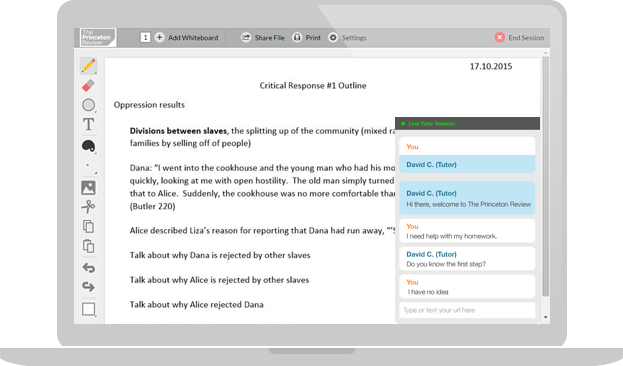
Improve Your U.S. History Grade
Better understand your homework, improve your exam scores, and raise your overall GPA. Get U.S. history homework help now .

Free MCAT Practice Test
I already know my score.

MCAT Self-Paced 14-Day Free Trial

Enrollment Advisor
1-800-2REVIEW (800-273-8439) ext. 1
1-877-LEARN-30
Mon-Fri 9AM-10PM ET
Sat-Sun 9AM-8PM ET
Student Support
1-800-2REVIEW (800-273-8439) ext. 2
Mon-Fri 9AM-9PM ET
Sat-Sun 8:30AM-5PM ET
Partnerships
- Teach or Tutor for Us
College Readiness
International
Advertising
Affiliate/Other
- Enrollment Terms & Conditions
- Accessibility
- Cigna Medical Transparency in Coverage
Register Book
Local Offices: Mon-Fri 9AM-6PM
- SAT Subject Tests
Academic Subjects
- Social Studies
Find the Right College
- College Rankings
- College Advice
- Applying to College
- Financial Aid
School & District Partnerships
- Professional Development
- Advice Articles
- Private Tutoring
- Mobile Apps
- Local Offices
- International Offices
- Work for Us
- Affiliate Program
- Partner with Us
- Advertise with Us
- International Partnerships
- Our Guarantees
- Accessibility – Canada
Privacy Policy | CA Privacy Notice | Do Not Sell or Share My Personal Information | Your Opt-Out Rights | Terms of Use | Site Map
©2024 TPR Education IP Holdings, LLC. All Rights Reserved. The Princeton Review is not affiliated with Princeton University
TPR Education, LLC (doing business as “The Princeton Review”) is controlled by Primavera Holdings Limited, a firm owned by Chinese nationals with a principal place of business in Hong Kong, China.

Who Invented Homework and Why

Who Invented Homework
Italian pedagog, Roberto Nevilis, was believed to have invented homework back in 1905 to help his students foster productive studying habits outside of school. However, we'll sound find out that the concept of homework has been around for much longer.
Homework, which most likely didn't have a specific term back then, already existed even in ancient civilizations. Think Greece, Rome, and even ancient Egypt. Over time, homework became standardized in our educational systems. This happened naturally over time, as the development of the formal education system continued.
In this article, we're going to attempt to find out who invented homework, and when was homework invented, and we're going to uncover if the creator of homework is a single person or a group of them. Read this article through to the end to find out.
Who Created Homework and When?
The concept of homework predates modern educational systems, with roots in ancient Rome. However, Roberto Nevilis is often, yet inaccurately, credited with inventing homework in 1905.Depending on various sources, this invention is dated either in the year 1095 or 1905.
The invention of homework is commonly attributed to Roberto Nevilis, an Italian pedagog who is said to have introduced it as a form of punishment for his students in 1905. However, the concept of homework predates Nevilis and has roots that go back much further in history.
The practice of assigning students work to be done outside of class time can be traced back to ancient civilizations, such as Rome, where Pliny the Younger (AD 61–113) encouraged his students to practice public speaking at home to improve their oratory skills.
It's important to note that the idea of formalized homework has evolved significantly over centuries, influenced by educational theories and pedagogical developments. The purpose and nature of homework have been subjects of debate among educators, with opinions varying on its effectiveness and impact on student learning and well-being.
It might be impossible to answer when was homework invented. A simpler question to ask is ‘what exactly is homework?’.
If you define it as work assigned to do outside of a formal educational setup, then homework might be as old as humanity itself. When most of what people studied were crafts and skills, practicing them outside of dedicated learning times may as well have been considered homework.
Let’s look at a few people who have been credited with formalizing homework over the past few thousand years.
Roberto Nevilis
Stories and speculations on the internet claim Roberto Nevilis is the one who invented school homework, or at least was the first person to assign homework back in 1905.
Who was he? He was an Italian educator who lived in Venice. He wanted to discipline and motivate his class of lackluster students. Unfortunately, claims online lack factual basis and strong proof that Roberto did invent homework.
Homework, as a concept, predates Roberto, and can't truly be assigned to a sole inventor. Moreover, it's hard to quantify where an idea truly emerges, because many ideas emerge from different parts of the world simultaneously or at similar times, therefore it's hard to truly pinpoint who invented this idea.
Pliny the Younger
Another culprit according to the internet lived a thousand years before Roberto Nevilis. Pliny the Younger was an oratory teacher in the first century AD in the Roman Empire.
He apparently asked his students to practice their oratory skills at home, which some people consider one of the first official versions of homework.
It is difficult to say with any certainty if this is the first time homework was assigned though because the idea of asking students to practice something outside classes probably existed in every human civilization for millennia.
Horace Mann
To answer the question of who invented homework and why, at least in the modern sense, we have to talk about Horace Mann. Horace Mann was an American educator and politician in the 19th century who was heavily influenced by movements in the newly-formed German state.
He is credited for bringing massive educational reform to America, and can definitely be considered the father of modern homework in the United States. However, his ideas were heavily influenced by the founding father of German nationalism Johann Gottlieb Fichte.
After the defeat of Napoleon and the liberation of Prussia in 1814, citizens went back to their own lives, there was no sense of national pride or German identity. Johann Gottlieb Fichte came up with the idea of Volkschule, a mandatory 9-year educational system provided by the government to combat this.
Homework already existed in Germany at this point in time but it became a requirement in Volkschule. Fichte wasn't motivated purely by educational reform, he wanted to demonstrate the positive impact and power of a centralized government, and assigning homework was a way of showing the state's power to influence personal and public life.
This effort to make citizens more patriotic worked and the system of education and homework slowly spread through Europe.
Horace Mann saw the system at work during a trip to Prussia in the 1840s and brought many of the concepts to America, including homework.
Who Invented Homework and Why?
Homework's history and objectives have evolved significantly over time, reflecting changing educational goals. Now, that we've gone through its history a bit, let's try to understand the "why". The people or people who made homework understood the advantages of it. Let's consider the following:
- Repetition, a key factor in long-term memory retention, is a primary goal of homework. It helps students solidify class-learned information. This is especially true in complex subjects like physics, where physics homework help can prove invaluable to learning effectively.
- Homework bridges classroom learning with real-world applications, enhancing memory and understanding.
- It identifies individual student weaknesses, allowing focused efforts to address them.
- Working independently at their own pace, students can overcome the distractions and constraints of a classroom setting through homework.
- By creating a continuous learning flow, homework shifts the perspective from viewing each school day as isolated to seeing education as an ongoing process.
- Homework is crucial for subjects like mathematics and sciences, where repetition is necessary to internalize complex processes.
- It's a tool for teachers to maximize classroom time, focusing on expanding understanding rather than just drilling fundamentals.
- Responsibility is a key lesson from homework. Students learn to manage time and prioritize tasks to meet deadlines.
- Research skills get honed through homework as students gather information from various sources.
- Students' creative potential is unleashed in homework, free from classroom constraints.
Struggling with your Homework?
Get your assignments done by real pros. Save your precious time and boost your marks with ease.
Who Invented Homework: Development in the 1900s
Thanks to Horace Mann, homework had become widespread in the American schooling system by 1900, but it wasn't universally popular amongst either students or parents.
The early 1900s homework bans
In 1901, California became the first state to ban homework. Since homework had made its way into the American educational system there had always been people who were against it for some surprising reasons.
Back then, children were expected to help on farms and family businesses, so homework was unpopular amongst parents who expected their children to help out at home. Many students also dropped out of school early because they found homework tedious and difficult.
Publications like Ladies' Home Journal and The New York Times printed statements and articles about the detrimental effects of homework on children's health.
The 1930 child labor laws
Homework became more common in the U.S. around the early 1900s. As to who made homework mandatory, the question remains open, but its emergence in the mainstream sure proved beneficial. Why is this?
Well, in 1930, child labor laws were created. It aimed to protect children from being exploited for labor and it made sure to enable children to have access to education and schooling. The timing was just right.
Speaking of homework, if you’re reading this article and have homework you need to attend to, send a “ do my homework ” request on Studyfy and instantly get the help of a professional right now.
Progressive reforms of the 1940s and 50s
With more research into education, psychology and memory, the importance of education became clear. Homework was understood as an important part of education and it evolved to become more useful and interesting to students.
Homework during the Cold War
Competition with the Soviet Union fueled many aspects of American life and politics. In a post-nuclear world, the importance of Science and Technology was evident.
The government believed that students had to be well-educated to compete with Soviet education systems. This is the time when homework became formalized, accepted, and a fundamental part of the American educational system.
1980s Nation at Risk
In 1983 the National Commission on Excellence in Education published Nation at Risk:
The Imperative for Educational Reform, a report about the poor condition of education in America. Still in the Cold War, this motivated the government in 1986 to talk about the benefits of homework in a pamphlet called “What Works” which highlighted the importance of homework.
Did you like our Homework Post?
For more help, tap into our pool of professional writers and get expert essay editing services!
Who Invented Homework: The Modern Homework Debate
Like it or not, homework has stuck through the times, remaining a central aspect in education since the end of the Cold War in 1991. So, who invented homework 😡 and when was homework invented?
We’ve tried to pinpoint different sources, and we’ve understood that many historical figures have contributed to its conception.
Horace Mann, in particular, was the man who apparently introduced homework in the U.S. But let’s reframe our perspective a bit. Instead of focusing on who invented homework, let’s ask ourselves why homework is beneficial in the first place. Let’s consider the pros and cons:
- Homework potentially enhances memory.
- Homework helps cultivate time management, self-learning, discipline, and cognitive skills.
- An excessive amount of work can cause mental health issues and burnout.
- Rigid homework tasks can take away time for productive and leisurely activities like arts and sports.
Meaningful homework tasks can challenge us and enrich our knowledge on certain topics, but too much homework can actually be detrimental. This is where Studyfy can be invaluable. Studyfy offers homework help.
All you need to do is click the “ do my assignment ” button and send us a request. Need instant professional help? You know where to go now.
Frequently asked questions
Who made homework.
As stated throughout the article, there was no sole "inventor of homework." We've established that homework has already existed in ancient civilizations, where people were assigned educational tasks to be done at home.
Let's look at ancient Greece; for example, students at the Academy of Athens were expected to recite and remember epic poems outside of their institutions. Similar practices were going on in ancient Egypt, China and Rome.
This is why we can't ascertain the sole inventor of homework. While history can give us hints that homework was practiced in different civilizations, it's not far-fetched to believe that there have been many undocumented events all across the globe that happened simultaneously where homework emerged.
Why was homework invented?
We've answered the question of "who invented homework 😡" and we've recognized that we cannot pinpoint it to one sole inventor. So, let's get back to the question of why homework was invented.
Homework arose from educational institutions, remained, and probably was invented because teachers and educators wanted to help students reinforce what they learned during class. They also believed that homework could improve memory and cognitive skills over time, as well as instill a sense of discipline.
In other words, homework's origins can be linked to academic performance and regular students practice. Academic life has replaced the anti-homework sentiment as homework bans proved to cause partial learning and a struggle to achieve conceptual clarity.
Speaking of, don't forget that Studyfy can help you with your homework, whether it's Python homework help or another topic. Don't wait too long to take advantage of expert help when you can do it now.
Is homework important for my learning journey?
Now that we've answered questions on who created homework and why it was invented, we can ask ourselves if homework is crucial in our learning journey.
At the end of the day, homework can be a crucial step to becoming more knowledgeable and disciplined over time.
Exercising our memory skills, learning independently without a teacher obliging us, and processing new information are all beneficial to our growth and evolution. However, whether a homework task is enriching or simply a filler depends on the quality of education you're getting.
Who Invented Homework, and Why Was Homework Invented? Let’s Explore!
If you are or have ever been a student, you have probably asked this question multiple times, and it hardly was to thank the person who invented homework personally. We all know that feeling all too well—the deadline is looming, you’re staring at a blank page, and there isn’t a single viable idea in your head.
Sounds familiar? Then you’re likely curious to investigate the history of homework and the cruel, cruel people who stand behind this centuries-old tradition. It’s quite fascinating, actually, and you will most certainly be surprised at how long and turbulent the history of giving learners homework is.
When, How, Why, and Who Invented Homework
To answer the question of who the title of the inventor of homework belongs to, we will have to go all the way back to the first century, then jump to eighteenth-century Europe, and finally move domestically to explore the trials and errors of the homework tradition in the U.S.
Some of the names we will address here include:
- Pliny the Younger —The Roman lawyer and author credited with the “invention” of homework,
- Johann Gottlieb Fichte —The German philosopher who developed the ideological justification of homework,
- Horace Mann —The first known American educator who made homework the norm in the U.S., and more.
Let’s dive in.
Who Created Homework and Why—How Everything Started
So, who started homework? The simplistic answer would be the Roman lawyer Pliny the Younger, who we’ll discuss in more detail below. However, it’s not that simple. It never is when it comes to homework, a tradition that could have existed long before it was linked to any historical artifacts and, therefore, lost to history.
After all, as much as almost every student despises homework, its number one purpose (or, at least, what we perceive as its number one purpose today) is self-evident. Most teachers genuinely care about their learners’ progress and academic achievements, so it’s no wonder they give home assignments to help students improve their learning.
However, as you will soon find out, this is only one of the many homework goals. Historically, it hasn’t even always been the most important one. Societal events, dominant philosophical schools, and individual educational reformers have always affected the mainstream view of homework and its perceived functions.
We invite you to join us on a journey through centuries (and then back again), where we will try to understand the origins, evolution, and current state of the homework tradition. If nothing else, you might have a chance to impress your friends at a trivia night.
Pliny the Younger
Have you already thought of the Roman Empire this week? If not, now’s your chance. The first name historians come across when looking for the origins of homework is Pliny the Younger, a Roman magistrate, lawyer, and brilliant orator in the first century A.D.
Pliny the Younger had students like many other distinguished authors and public speakers in Rome. He taught rhetoric and public speaking and—you guessed it—tasked his students with practicing their speech composing and public speaking skills even outside his classes. Also, Pliny actively encouraged them to put their newly acquired skills to practice in appropriate settings.
Johann Gottlieb Fichte
Here comes a huge time jump—to eighteenth-century Germany. Sure, homework probably existed between the Roman times and the eighteenth century. However, nothing groundbreaking happened to it during all those centuries, so there’s no point in retelling every little step.
Johann Gottlieb Fichte was a German philosopher in post-Napoleon Europe who advocated for a uniform national education system, similar to other voices of German idealism. He emphasized that teaching the youth was as much about instilling a sense of national identity in them as teaching them traditional disciplines. For Fichte, homework was one of the strategies for achieving that.
Horace Mann
At this point, you might wonder, “What about the U.S.?” Well, the title of the pioneer of homework in the New World belongs to Horace Mann, otherwise known as “the father of the American public school system.” In the nineteenth century, education for children was still not compulsory, and Mann advocated for changing that.
Mann was the first educator to emphasize the role of parents in every child’s learning journey. He believed homework could reinforce the lessons taught in school, teach the youth self-discipline and improve their relationships with parents. He added a new layer to why homework was invented and made mainstream.
Roberto Nevilis: What Was His Role in the Origins of Homework?
The first thing you need to know about Roberto Nevilis is that he didn’t exist. A popular myth suggests that Nevilis invented homework at the beginning of the twentieth century as a form of punishment for students who didn’t work hard enough in class. That’s completely untrue.
Here are a few facts about Roberto Nevilis. According to the legend, Roberto Nevilis was an Italian teacher who lived at the end of the nineteenth and beginning of the twentieth century in Venice, Italy. He was supposedly the first educator to give homework to his students, which allegedly happened in 1905. If you look up his (more or less fictional) “story” online, you will find that he initially only gave home assignments to students who failed to understand the material in class or weren’t diligent enough.
Why did Roberto Nevilis create homework? As you can probably guess by now, the more accurate question would be, “Why would someone bother to invent the person named Roberto Nevilis and credit this semi-fictional character with inventing homework?” Sadly, though, there’s no clear answer. Whoever did this wanted students or the general public to believe that the number one purpose of homework was punishment for poor performance. That’s not the case.
Was the History of Homework in the United States Any Different?
Now, let’s move beyond Horace Mann’s name and explore homework history in the Americas or, more specifically, the U.S. One of the first questions people curious about the topic ask is, “What year was homework invented in the United States?” There’s no straightforward answer to this, either. All we know is that homework started becoming a standard practice somewhere on the cusp of the nineteenth and twentieth centuries—largely thanks to Mann’s effort.
The U.S. wasn’t any different from other countries in that the mainstream views on homework evolved with societal norms (which, in turn, shaped educational priorities). For example, by the beginning of the twentieth century, the idea became more or less universal: homework promoted students’ growth beyond learning the material taught in class. Educators believed it was also helpful for building character and applying the knowledge gained in practical contexts.
However, the beginning of the twentieth century was also when the progressive education movement grew increasingly popular. Among other things, its proponents advocated against homework because they believed that it contracted the fundamentals of child-centered learning. The opposing views on giving home assignments coexisted side by side; to an extent, they still do.
The Ban on Homework in the 1900s
The 1900s was the first time in American history since homework origin when it became very popular to reject the need for homework. The progressive movement grew more influential by the day, eventually culminating in the homework ban.
From being the underdogs of sorts, homework’s progressive critics turned into the loudest voice in the education system, and their demands were eventually met, albeit not everywhere.
Their arguments were straightforward and understandable, at least to an extent. They claimed that homework got in the way of students’ socializing after school hours, interfered with the family dynamics, and strained students’ physical and mental health.
The Need for Children’s Domestic Labor in the 1930s
The 1930s wasn’t a good time for the first homework advocates. This was when the Great Depression hit the U.S. severely and put the economic crisis at the forefront of basically everything happening in the country, including education.
More and more parents came forward demanding the end of homework because they needed their children to help at home—be it with domestic labor, farming, or anything else.
Parents’ demands were fruitful. The educational practices of the 1930s stemmed from the idea that outside of school hours, students should be able to focus on their lives at home without the additional burden of homework.
The Post-World War II Shift in the Views on Homework
The situation changed drastically after World War II. If you’re wondering how old is homework the way we know it today, that’s when it started.
First, the nation was thriving economically, which made it possible to focus on the importance of education. Also, as the Cold War started, the value of education became more apparent than ever. The U.S. needed well-educated citizens who could contribute to technological advancements and effectively protect the nation’s security.
For example, when the Soviets launched Sputnik in 1957, one of the main debates in the American media was about young people’s readiness to remain competitive on a global scale.
How Homework Looks for Americal Children in the 21st Century
.webp)
Today, we can still see some of the dilemmas surrounding the topic over a century ago. For example, there are two clear camps: educators who believe homework is necessary for academic achievement and their colleagues who don’t think that to become a well-rounded and successful individual, a child must spend hours daily completing home assignments.
Still, the most popular view is quite well-balanced. The main idea behind that is maximizing the educational benefits of homework while minimizing its potential drawbacks. This implies setting reasonable limits on the amount of homework, designing meaningful assignments, and prioritizing students’ holistic development.
What’s the Purpose of Homework?
Even a child knows the number one reason they must do their homework (even if they don’t necessarily agree). Obviously, the main purpose of homework is to help students better digest the material they learn in class.
But that’s not the only one. Other goals of homework include:
- To teach students how to work independently and think critically;
- To motivate students to prepare for upcoming lessons (thus making the teacher’s job a little easier);
- To encourage responsibility and organization;
- To cultivate collaboration skills (via group assignments);
- To strengthen the child-parent bond, and more.
What’s the Impact of Homework on the Quality of Education
So, how does homework improve the quality of education?
- Promotes understanding and reflection.
- Improves study habits and time management.
- Makes it possible for teachers to give anonymous and personalized feedback to each student.
- Prepares students for standardized assessments (such as SATs).
- Supports diverse learning needs.
The Pros of Homework
The complete list of the advantages of homework would be too long to include here, but here are some of the undeniable benefits of giving the students at least some work to do at home:
✅ Reinforces learning
✅ Promotes independent learning
✅ Develops positive study habits
✅ Increases retention
✅ Facilitates parental involvement
✅ Enables customized learning, and so on.
.webp)
The Cons of Homework
At the same time, even the most adamant proponents of homework recognize that the tradition does have its flaws. The drawbacks of homework include the following:
❌ Causes extra stress and anxiety
❌ Gets in the way of students’ relationships with family members and social lives
❌ Might get in the way of healthy extracurricular activities, such as sports
❌ Creates additional pressure on teachers.
Who made homework a thing?
Why was homework invented have the reasons changed since then, is homework really necessary for effective learning, when was homework first invented did it look the same, how does homework look today who writes the rules.
As you can see, homework history—both in the U.S. and worldwide—has been quite turbulent. Much to today’s students’ envy, there were times when it was illegal, at least in some places.
However, now is not one of those periods. While some non-mainstream educational systems and paradigms deny the need for homework, most educators believe that the benefits of homework outweigh its flaws. The key is to design genuinely stimulating and engaging assignments and avoid overdoing things. Students should be able to relax after school hours without the risk of falling behind.
If you ask an average teacher these days, they will probably tell you that the optimal amount of homework per week is roughly 7-10 hours. That’s enough to practice what was learned in class and engage with the material critically. At the same time, it’s not too much, so the risks of causing students extra stress and harming their social lives are very unlikely.
What matters the most is not how much homework a teacher gives but how creative and stimulating the assignments are. Ideally, students should be excited to complete them.
.webp)
You Might Also Be Interested In


History Spot - Articles, Facts, & More
History Spot is a history website that covers the basics of history. We provide free history articles, facts, and fun activities! These resources are perfect for students, adults, or anyone else looking to improve their knowledge! At History Spot, also known as HistorySpot, we update our site weekly to always provide the most up-to-date content.
More Information About History Spot
History Spot launched in January of 2023, featuring over 100 activities and 10 articles. We have continued to work on and upgrade our site as much as possible! If you see something that is not working with our website, fill out this form. We check every response to make sure everything is always working! If you have an idea for History Spot, fill out this form , and we will try our best to add your idea. If you want to learn some more about History Spot, check out our about us page!
- May 23 Classical Academy says goodbye to first-ever Saudi Arabian foreign exchange student
- May 23 Senior Brady Goe receives lucrative baseball scholarship
- May 10 Chess World Championship Tournament Ends in a Victory for Chinese Grandmaster
- January 31 Did Knives Out Age Like Milk?
- January 25 See How They Run: An Wall-Breaking Whodunnit

Entertainment
Homework: The True Reality Behind It
Sophia Wecker , Editor | March 16, 2021

Photo provided by Sigmund
Homework. Something almost everyone in school— no matter what age, grade or where they live— all dread. But, why do we have homework?
In 1905, an Italian teacher named Roberto Nevilis invented the concept of “homework.” Originally, its purpose was to be used as a punishment for students who were lazy in class or for those who were disobedient or rude to their teacher. This practice became popular and became more frequently used around the world. A few years after it was invented, it became a standard thing that almost all teachers worldwide began regularly giving out to students after school every day or most days.
Students are usually mentally and physically drained when they come home from school, sports, or after they go somewhere after school and having homework assigned to them puts more even stress onto their plates. Whereas other students might like homework or enjoy doing it because it can benefit them academically or might help with avoiding boredom. Either way, there are both positive and negative sides to homework.
Nowadays, teachers assign homework for either what was left over from class or for extra work to help expand upon the topics taught while in school. But, is that really a smart and good reason to assign homework? Like what was mentioned earlier, students like to come home after a long day of school and relax and have some downtime or possibly hang out with their friends and/or family. But if they have assignments that could take them multiple hours to do that are all due by midnight, this erases this precious free time for students.
Though we may hate to admit it, there are some upsides to homework. Students who need extra help or practice on a topic or subject may benefit from additional work through their homework. Others might like some extra practice to better their understanding or to possibly get ahead in a subject to get higher test and quiz scores.
Despite the extra help homework gives, it’s not always necessary. Like mentioned earlier, some students may have a hard time completing homework because of time, their own individual lives and it just might not be needed for some students so it shouldn’t be necessary for them.
Although homework is annoying and isn’t always necessary, we need to continue to do our best and complete this task because it will benefit us later in life. But I do ask teachers to give students a break or to give them time to rest up after long and hard days. On a personal note, homework has always been a struggle for me to get done because of my busy schedule, but as mentioned before, I do ask teachers to give less or no homework, out of the courtesy of students’ time. Although we might need homework for extra help, those who do excel and are carrying good grades in a class do not need extra work. Teachers, please take from this article and help the students in your classrooms to do their best, not by giving them homework, but by understanding their circumstances and their own individual lives.

Red Velvet – Your Sweet New Obsession

Spotify’s Newest Non-Genre

Rating Halloween Candy as Someone Who Hates Food

Mental, Physical, and Emotional: Keep Yourself Healthy

Dear Discouraged Student

Chess World Championship Tournament Ends in a Victory for Chinese Grandmaster

Did Knives Out Age Like Milk?

See How They Run: An Wall-Breaking Whodunnit

Decision To Leave – An Impressive Waste Of Time?

From an Irate Senior to CAHS Administration: A Letter Concerning the 2022-2023 Phone Policy

Among Us Update: And All the Things You Need to Know About It

What happened to Disneyland?

How to Keep Yourself Occupied and Electronic Free

Fighting for Womens’ Rights

Me Tight Pirate Pants: A voyage into a cryptic song from my childhood
Classical Academy High School's Online News Site
Comments (10)
Cancel reply
Your email address will not be published. Required fields are marked *
This site uses Akismet to reduce spam. Learn how your comment data is processed .
Logan • Oct 20, 2022 at 11:28 am
if you are doing an essay on homework here are some more websites for 6-8th grade: Johnson, Geoff. “Piling Homework on Kids Is a Mistake That Undermines Work/Life Balance.” Times-Colonist, 09/05 2021. ProQuest; SIRS Issues Researcher, https://explore.proquest.com/sirsissuesresearcher/document/2578243016?accountid=65482 .
Moniuszko, S. M. (2021, 08/23). Heavy Homework Load May Be Detrimental to Health. USA TODAY https://explore.proquest.com/sirsissuesresearcher/document/2564234859?accountid=65482
Patterson, K. (2021, 11/09). Homework Isn’t Helpful in First Grade Or in College. University Wire https://explore.proquest.com/sirsissuesresearcher/document/2617064023?accountid=65482
Logan • Oct 20, 2022 at 11:31 am
also the cites are in APA 7
ethan • Oct 17, 2022 at 7:07 am
you helped my essay
FreezingZozi • Oct 4, 2022 at 8:59 am
why don’t they give homework to students that want or need homework not everyone in a class
Ece • Oct 1, 2022 at 1:43 pm
tysm good story
Ali Syed Karim • Sep 25, 2022 at 6:43 pm
The fact that homework is for all students is annoying, and its original use was just for students who were lazy or who were being disrespectful and disobedient in class. I hate homework.
James • Jun 7, 2022 at 6:02 am
this is relay helpful
Matthew • Apr 7, 2022 at 12:27 pm
James • Jun 7, 2022 at 6:17 am
Karen • Aug 3, 2022 at 6:42 pm
Great story
Get starter every day!
Who Invented Homework and Why? All You Need to Know
Today, homework is deeply assimilated into the universal educational system. Have you ever wondered how after-class assignments started in the first place? Who invented homework and why? Students are curious why take-home task just like examinations is so important that it forms part of the basic elements of education. Do you want to know who invented homework and the reasons for such an invention? Let’s find out in this article.
The History of Homework
The origin of homework is dated as far back as the time of the Roman Empire. Some consider Pliny the Younger as the person that introduced the homework simulation. Pliny the Younger was a teacher that made his Quintilian students complete some tasks at home. Pliny intended to help his students develop their oratory skills in a less tense environment.
The new practice yielded positive results such that other oncoming educators were encouraged to follow suit. However, Roberto Nevilis of Italy is officially recognized as the person who created homework. He invented homework in 1905. However, the reason Nevilis invented homework was to punish his students.

Homework at the Beginning of the 20th Century
The end of the 19th century introduced reforms mitigating the tedious nature of homework. The contemporary take-home assignment popular around the world today takes the form of homework invented by Nevilis.
In the 19th century, Horace Mann played a leading role in promoting the acceptance of home assignments in the educational system. Mann was an educational reformer and politician with a policy to enforce compulsory education. The after-class assignment was conceived as child labor in the 1900s. However, the changes introduced in the 20th century stipulated that home tasks should be practicable, simple, and assigned when students can work independently.
Other Reason Homework Was Introduced By Roberto Nevilis
There are arguments providing reasons homework should be banned. However, in the modern world, after-class assignments are considered essential in the learning process of children. Likewise, those who invented home assignments believe they are necessary to improve the educational process. Roberto Nevilis gives a few reasons why he thought homework was important. Some of them include reading without external assessment, a convenient study habit, and individual planning of the study pattern.
The Importance of Home Assignments in Schooling
Homework plays a major role in enhancing the learning process. According to psychologists, students need to assimilate the knowledge that is passed in the classroom. Class activities alone are insufficient to internalize information taught in the classroom. Home assignments support the teacher’s effort to educate the students and allow the students to independently internalize knowledge.
Unlike during the era of Roberto Neville, the purpose of homework is not to punish or control the students. It provides the opportunity to dedicate personal time for an in-depth study of a subject. These reasons are above the intention of the person who invented homework. In today’s educational system, after-class assignments help in improving learning in all levels of education. However, you can always hire writing professionals to take my online course or do any task you assign to them and feel no more pressure.
Leave a Reply Cancel reply
Your email address will not be published. Required fields are marked *
MORE SECTIONS
- Dear Deidre
MORE FROM THE SUN
- Newsletters
- Deliver my newspaper
- Sun Vouchers
- The Sun Digital Newspaper
- Racing Members Enclosure

As parents struggle with history homework, test your knowledge with our quiz to see if you’re smarter than 10-year-old
- Samantha Yule
- Published : 0:16, 26 May 2024
- Updated : 0:16, 26 May 2024
ARE you a bit hazy about the distant past?
Many parents struggle with kids’ history homework – and a quiz set by ten-year-olds based on their Year Six lessons found a lot of adults haven’t the foggiest.

One in four did not know when the Battle of Hastings was and three per cent reckoned the victor was, er, Robin Hood.
The results, analysed by Trainline, revealed 23 per cent do not know which animal carried the Black Death and 40 per cent have no clue who built Hadrian’s Wall.
Samantha Yule sets some history questions for readers to find out if they are smarter than a ten-year-old.
1. What year was the Battle of Hastings?
READ MORE QUIZZES AND PUZZLES

You have a high IQ if you spot a hidden flyer on the bulletin board in 23 secs

You've got 20/20 vision if you can spot the cat hiding in the yard in 9 seconds
A) 1066 B) 1666 C) 1966
2. What was Queen Victoria’s husband called?
A) Charles B) Boris C) Albert

3. When is Stonehenge thought to have been built?
Most read in News

Trump slams hush-money hearing as a 'disgrace' & insists 'I'm innocent'

This Morning in crisis as ratings plummet since Cat & Ben crowned new hosts

BGT judge Amanda Holden risks Ofcom complaints as she wears sexiest look yet

Brit hero to star in Strictly as BBC battles to boost show amid Gio scandal
A) 30 BC B) 300 BC C) 3,000 BC
4. What animal carried the Black Death?
A) Badgers B) Rats C) Dogs
5. Who built Hadrian’s Wall?
A) Romans B) Vikings C) Normans

6. When did World War One take place?
A) 1939 to 1945 B) 1914 to 1918 C) 2003 to 2011
7. When did the Great Fire of London break out?
A) 1066 B) 1666 C) 1806

8. Who was caught trying to blow up the Houses of Parliament in 1605?
A) King Charles II B) Oliver Cromwell C) Guy Fawkes
9. Who did Boudicca fight when they came to take her land?
A) Victorians B) Normans C) Romans

10. Who won the Battle of Hastings?
A) Robin Hood B) William I C) King Harold

11. Who was Prime Minister of the UK at the beginning of World War Two?
A) Winston Churchill B) Margaret Thatcher C) Neville Chamberlain
12. How many wives did Henry VIII have?
A) 6 B) 7 C) 8
13. What is Romeo’s surname in Romeo and Juliet?
A) Beckham B) Capulet C) Montague

14. Who was the Lady with the Lamp?
A) Florence Nightingale B) Mother Teresa C) Mary Seacole
15. In which year in Victorian times did a law pass to make all children go to school?
A) 1850 B) 1870 C) 1899
16. Which of these is a term for an archaeological object?
A) Subject B) Histogram C) Artefact

17. Where did Neil Armstrong go in 1969?
A) The Moon B) Mars C) Venus

18. Who was Queen for most of William Shakespeare’s life?
A) Elizabeth I B) Elizabeth II C) Mary I
19. When did Romans invade Britain?
A) 43 AD B) 410 AD C) 252 AD
READ MORE SUN STORIES

BGT fans gasp as Bruno Tonioli makes awful blunder live on semi-final

Major UK airport SCRAPS hated hand luggage rule just in time for summer
20. In which period did Florence Nightingale live?
A) Edwardian B) Victorian C) Tudor
1) A 2) C 3) C 4) B 5) A 6) B 7) B 8) C 9) C 10) B 11) C 12) A 13) C 14) A 15) B 16) C 17) A 18) A 19) A 20) B
- Quizzes puzzles and brain teasers
- The Sun Newspaper

HIX.AI Launches HIX Tutor: The Ultimate AI Homework Helper
S INGAPORE, May 16, 2024 PRNewswire -- HIX.AI, an all-in-one AI writing copilot has officially launched HIX Tutor, a powerful AI homework helper that provides step-by-step solutions to homework problems and exam questions. The homework AI tool is designed to help with all subjects including math, physics, chemistry, history, literature, and foreign languages, just to name a few.
The platform is powered by the latest GPT models but is tailored to offer far more enhanced functionality than even ChatGPT and GPT-4. HIX Tutor allows users to upload images for easier problem solving. Simply take a picture containing the question or equation and using advanced analysis, the tool will scan it to produce an accurate, detailed solution in mere seconds.
There is also a built-in math AI calculator that enables users to solve a wide range of mathematical equations in a flash. From basic arithmetic to advanced calculus, the keyboard offers all the necessary formulaic inputs one needs to get accurate answers.
HIX Tutor also offers AI Tutor, an AI chatbot to further enhance your learning experience. It provides quick answers to any homework questions you ask or upload, offering interactive study assistance for any subject in any grade level.
With HIX Tutor, students not only arrive at correct answers but also understand the underlying principles. According to Camille Sawyer, CEO of HIX.AI, "HIX Tutor is made to be the ultimate study aid that guides any user along their academic journey. For this reason, it is trained to deliver precise answers and step-by-step explanations to help students better understand their schoolwork."
HIX Tutor can help students better prepare for exams. They can get clear clarifications on difficult concepts or practice questions from their textbooks. It improves students' understanding of their study material, whether they are in high school, college, or post-graduate studies.
In addition, this homework AI tool also has an extensive knowledge base of free study resources that cover different subdisciplines within science, math, and humanities, enabling users to get expert answers to commonly asked homework questions for algebra, astronomy, and so much more.
Camille Sawyer went on to add, "With broad accessibility in mind, we've ensured that HIX Tutor is user-friendly enough to accommodate anyone that needs reliable homework assistance at any time." Since HIX Tutor is also free to use, this makes it a viable homework AI option for budget-limited users looking for an affordable and effective homework solution.
For more information, please visit: https:tutor.hix.ai
4415045_CN15045_0


Welcome to GPFans
CHOOSE YOUR COUNTRY

- Leaderboard
F1 Standings
- Race Calendar
Are you a F1 Fan? Follow GP Fans
- Privacy and Terms

F1 Monaco Grand Prix 2024 results: Final classification with penalties applied

Charles Leclerc has claimed a sensational sixth career win at the 2024 Monaco Grand Prix.
The Ferrari star's win marks a historic moment, as he becomes the first Monegasque driver to stand atop the podium in Monaco in the F1 World Championship era.
Previously, Louis Chiron, a Monegasque racing driver, had won the Monaco GP in 1931, back in the third edition of the race held before the official championship began.
However, Leclerc's triumph wasn't a lonely one for Ferrari. The top three in Saturday's qualifying remained unchanged, with McLaren's Oscar Piastri in second and Carlos Sainz completing the Scuderia's strong showing in third. Lando Norris in the other McLaren and George Russell of Mercedes followed suit, rounding out the top five.
Meanwhile, Max Verstappen 's title defence took a slight hit as he finished the race in sixth, the same position he started from. Lewis Hamilton followed in seventh, unable to make significant progress on the notoriously difficult-to-overtake Circuit de Monaco.
READ MORE: Red Bull DISASTER diminishes championship lead

The race got off to a dramatic start with a first-lap crash involving Sergio Perez and the Haas duo of Nico Hulkenberg and Kevin Magnussen.
Magnussen, who was already walking a tightrope with 10 penalty points before Monaco, made contact with the rear of Perez's Red Bull, sending the Mexican driver into a heavy crash into the barriers.
While Magnussen narrowly avoided further penalty points, his existing tally means he will need to tread carefully in the remaining races to avoid a historic race ban - the first ever under the current penalty point system introduced back in 2014.
The opening lap also saw drama within the Alpine team as team-mates Esteban Ocon and Pierre Gasly collided .
Ocon, who retired from the race later, was penalised with a 10-second time penalty that was then converted into a five-place grid penalty for the next race in Canada, along with two penalty points added to his FIA Super Licence.
READ MORE: F1 Penalties Explained: What are they and how do drivers get banned?
2024 Monaco GP - Final classification
1. Charles Leclerc [Ferrari]: 2:23:15.554 2. Oscar Piastri [ McLaren ]: +7.152sec 3. Carlos Sainz [Ferrari]: +7.585sec 4. Lando Norris [McLaren]: +8.650sec 5. George Russell [ Mercedes ]: +13.309sec 6. Max Verstappen [Red Bull]: +13.853sec 7. Lewis Hamilton [Mercedes]: - +14.908sec 8. Yuki Tsunoda [VCARB]: 1 LAP 9. Alexander Albon [ Williams ]: 1 LAP 10. Pierre Gasly [Alpine]: 1 LAP 11. Fernando Alonso [Aston Martin]: 2 LAPS 12. Daniel Ricciardo [VCARB]: 2 LAPS 13. Valtteri Bottas [Kick Sauber]: 2 LAPS 14. Lance Stroll [Aston Martin]: 2 LAPS 15. Logan Sargeant [Williams]: 2 LAPS 16. Zhou Guanyu [Kick Sauber]: 2 LAPS NC. Esteban Ocon [Alpine]: DNF NC. Sergio Perez [Red Bull]: DNF NC. Nico Hulkenberg [ Haas ]: DNF NC. Kevin Magnussen [Haas]: DNF
Fastest Lap: Lewis Hamilton [Mercedes] - 1:14.165 on lap 63
READ MORE: GPFans Hot Takes - Hamilton 'counting down the days' as TITLE RACE is on

Brundle claims Red Bull performance decline caused by SHOCK news
- 3 hours ago

Ricciardo's Red Bull future to be decided within 'next few DAYS'
- Yesterday 21:56
Change your timezone:
Latest news.

Huge Hamilton TRANSFORMATION revealed in F1 24
- 50 minutes ago

F1 team AXE veteran title winning star

F1 News Today: Hamilton in F1 SNUB as Mercedes make key driver decision

Schumacher interview reveals controversial criticism of F1 rival
- Today 10:57

EXCLUSIVE: Audi F1 star delivers fresh update over future team-mate
- Today 09:57
F1 Race Calendar 2024

- F1 News 24/7
Related news

Marko reveals Red Bull deadline for new Verstappen team-mate decision

F1 team makes BIG decision amid rumours star driver could be replaced
- Constructors
Driver Standings 2024

Constructor Standings 2024

- Oliver Bearman
- Charles Leclerc
- Carlos Sainz
- Lando Norris
- Oscar Piastri
- Pierre Gasly
- Esteban Ocon
- Sergio Pérez
- Max Verstappen
- Alexander Albon
- Logan Sargeant
- Lewis Hamilton
- George Russell
- Nico Hülkenberg
- Kevin Magnussen
- Fernando Alonso
- Lance Stroll
- Valtteri Bottas
- Zhou Guanyu
- Daniel Ricciardo
- Yuki Tsunoda
- Aston Martin
- Haas F1 Team
- Red Bull Racing
- Stake F1 Team
- Visa Cash App RB

About GPFans
Follow us on your favorite social media channel.
- /formula1fanpage
- @gpfansglobal
- /GPFansGlobal
Corporate & Media

Realtimes | Publishing Network
- FootballTransfers.com
- FootballCritic.com
- FCUpdate.nl
- Fightfans.co.uk
- MovieMeter.nl
- MusicMeter.nl
- WijWedden.net
- Kelderklasse
- Anfieldwatch
- MeeMetOranje.nl

IMAGES
VIDEO
COMMENTS
The History of Homework in America. Despite homework being a near-universal part of the American educational experience today, it hasn't always been universally accepted. Take a look at its turbulent history in America. 1900s: Anti-Homework Sentiment & Homework Bans.
One teacher proposed "homework" consisting of after-school "field trips to the woods, factories, museums, libraries, art galleries.". In 1937, Carleton Washburne, an influential educator who was the superintendent of the Winnetka, Illinois, schools, proposed a homework regimen of "cooking and sewing…meal planning…budgeting, home ...
The inventor of homework may be unknown, but its evolution reflects contributions from educators, philosophers, and students. Homework reinforces learning, fosters discipline, and prepares students for the future, spanning from ancient civilizations to modern education. Ongoing debates probe its balance, efficacy, equity, and accessibility, prompting innovative alternatives like project-based ...
Homework is a set of tasks assigned to students by their teachers to be completed at home. ... Given the extensive scope of the history and practices of homework in various countries, including a comprehensive analysis within this article is not feasible. Therefore, it tried to providing insights into the context of homework in the United ...
The history of education and homework now moves to Horace Mann (1796—1859), an American educational reformer, spent some time in Prussia. There, he learned more about Germany's Volksshulen, forms of education, and homework practices. Mann liked what he saw and brought this system back to America. As a result, homework rapidly became a ...
The 19th-century politician and educational reformer Horace Mann played a large role in the history of homework. Mann, like his contemporaries Henry Barnard and Calvin Ellis Stowe, had a strong ...
The history of homework in the United States is a varied one, both in substance and in perceived value. Over the years, its presentation has changed markedly, and its popularity has waxed and waned. In the early 1800s, in an agrarian society, the school year was short and homework was of little significance. There was little time for it ...
These are nearly 500 student history worksheets in this package that cover all aspects of history, from Ancient Greece to World War One, World War Two, and the Cold War. The worksheets can be modified to accommodate K-12. Please feel free to share these on Pinterest or any other places where teachers' resources are made available.
In the first half of the 20th century, U.S. educators shunned homework. The Soviet Union's launch of Sputnik 1 changed that. Middle-schoolers who trudge home each day with a 50-pound backpack ...
Ideal for homework. 1 Topic. £ 4 £1.40 Per Student. 3 Accounts. Edexcel Modern World. Suitable for 9-1 GCSE. Historyhomework.com provides Edexcel GCSE history knowledge tests. They test student knowledge and skill in the four main assessment objectives. Each history homework test is in providing instant gap analysis.
This anti-homework sentiment faded, though, amid mid-century fears that the U.S. was falling behind the Soviet Union (which led to more homework), only to resurface in the 1960s and '70s, when a ...
HISTORY OF HOMEWORK. Dec 19, 1999. Mid-19th century: Most students leave school after sixth grade. High school homework is demanding but uncontroversial. 1900-1913: Ladies' Home Journal takes up a ...
Responses indicating no homework on the "usual" question in 2004 were: 2% for age 9-year-olds, 5% for 13 year olds, and 12% for 17-year-olds. These figures are much less than the ones reported ...
The land that became the United States has been inhabited for some 60,000 years. The first people to live on the land were hunters who most likely migrated to North America from Asia. Eventually these people and their descendants—the Native Americans —spread across North and South America.
Homework is typically credited to Roberto Nevelis of Venice, Italy, who invented it in 1095—or 1905, depending on your sources. However, upon closer examination, he appears to be more of an internet legend than a genuine figure. Horace Mann. Horace Mann, a 19th-century politician and educational reformer, was a pivotal figure in the ...
Homework has been a controversial teaching strategy throughout the twentieth century and continuing into the twenty-first. This brief presents a history of homework, in which media-fueled outcries for more or less homework occur cyclically, about fifteen to twenty years apart. It describes homework practices today and the beneficial and negative effects it can have beyond achievement on young ...
U.S. History Homework Help. Learning U.S. history is more than memorizing dates, places and people. Discuss the founding leaders, write essays on Puritans in America, and understand the symbolism in the political cartoons of the time period. We have tutors readily available 24/7 to help you improve your grades.
However, the concept of homework predates Nevilis and has roots that go back much further in history. The practice of assigning students work to be done outside of class time can be traced back to ancient civilizations, such as Rome, where Pliny the Younger (AD 61-113) encouraged his students to practice public speaking at home to improve ...
Pliny the Younger —The Roman lawyer and author credited with the "invention" of homework, Johann Gottlieb Fichte —The German philosopher who developed the ideological justification of homework, Horace Mann —The first known American educator who made homework the norm in the U.S., and more. Let's dive in.
History Spot - Articles, Facts, & More. History Spot is a history website that covers the basics of history. We provide free history articles, facts, and fun activities! These resources are perfect for students, adults, or anyone else looking to improve their knowledge! At History Spot, also known as HistorySpot, we update our site weekly to ...
Homework. Something almost everyone in school— no matter what age, grade or where they live— all dread. But, why do we have homework? In 1905, an Italian teacher named Roberto Nevilis invented the concept of "homework." Originally, its purpose was to be used as a punishment for students who were lazy in class or for those who were disobedient or rude to their teacher.
The History of Homework. The origin of homework is dated as far back as the time of the Roman Empire. Some consider Pliny the Younger as the person that introduced the homework simulation. Pliny the Younger was a teacher that made his Quintilian students complete some tasks at home. Pliny intended to help his students develop their oratory ...
From dioramas to book reports, from algebraic word problems to research projects, whether students should be given homework, as well as the type and amount of homework, has been debated for over a century. []While we are unsure who invented homework, we do know that the word "homework" dates back to ancient Rome. Pliny the Younger asked his followers to practice their speeches at home.
Many parents struggle with kids' history homework - and a quiz set by ten-year-olds based on their Year Six lessons found a lot of adults haven't the foggiest. 10.
The Inevitability of the Civil War: An Analysis The Civil War remains one of the most pivotal events in American history. A pressing question among historians is whether this conflict was inevitable. Delving into the complexities of the pre-war period reveals how intertwined and contentious the issue of slavery was, and how divergent interpretations have shaped our understanding of this ...
The homework AI tool is designed to help with all subjects including math, physics, chemistry, history, literature, and foreign languages, just to name a few. The platform is powered by the latest ...
Yara Elshebiny Monday 27 May 2024 07:29. Charles Leclerc has claimed a sensational sixth career win at the 2024 Monaco Grand Prix. The Ferrari star's win marks a historic moment, as he becomes the first Monegasque driver to stand atop the podium in Monaco in the F1 World Championship era.